
|
#940 (8/17/22)

|
|
MODERN RECORDS - PART THREE (1949-1952) |
|
THIS ARTICLE IS IN MEMORY OF DAVID SAVIET WHO LEFT US ON OCTOBER 22, 2022.
DAVE CONTRIBUTED TO THIS WEBSITE FOR OVER SIXTEEN YEARS. HE MASTERFULLY RESTORED ALL THE 78-RPM RECORDS' AUDIO, MAKING THEM SOUND GREAT! |
Includes Audio For Forty-Six Songs
(Audio Restored By Dave Saviet - Images Restored By Tony Fournier)
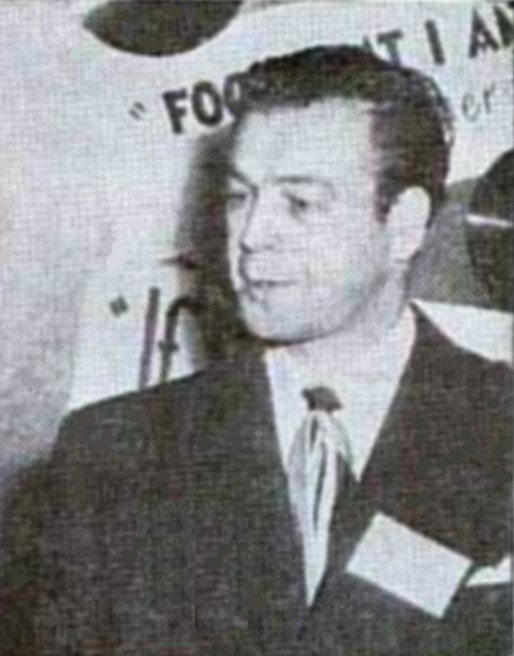
|
Above: (L-R) Picture of Jules Bihari, the President of Modern Records, taken from The Billboard dated January 31, 1948.
NOTE: On the wall behind Jules, is "Fool That I Am", which was very popular in 1947-1948. Among the artists to record that song in that time span were The Ravens (National), The Brooks Brothers (Decca), Dinah Washington (Mercury), Billy Eckstine (M-G-M), Gladys Palmer (Miracle), and Erskine Hawkins (RCA Victor). However, no artist on Modern Records released a version of this song.)
Part Three of this article will pertain to Modern Records for the period 1949-1952. The artists included here are Hadda Brooks, The Ebonaires, Jimmy Witherspoon, Helen Humes, Roy Hawkins, Charley Booker, Robert Bland, and Mary Sue. Also highlighted will be the songs "Bewildered", "Three O'Clock In The Morning", "Be-Baba-Leba", and "They Raided The Joint".
HADDA BROOKS: Hadda Brooks was featured in Part One of this article. No doubt about it, Hadda was the main reason for the early success of Modern Records. From Modern's first record and through 1949, after which she left the label, she was a consistent record seller.
After leaving Modern, Hadda had releases on London (1950-51), Okeh (1952-54), and Epic (1955) before returning to Modern/Crown in 1956.
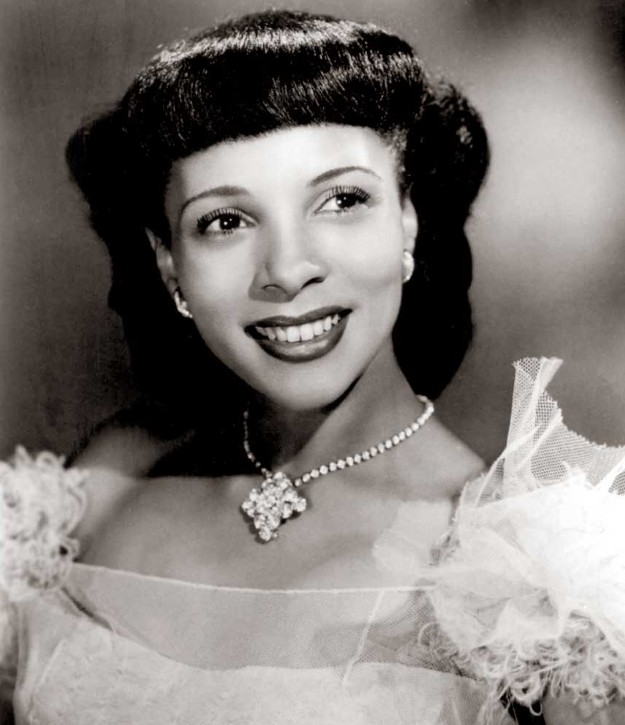
|
Above: Photo of Hadda Brooks.
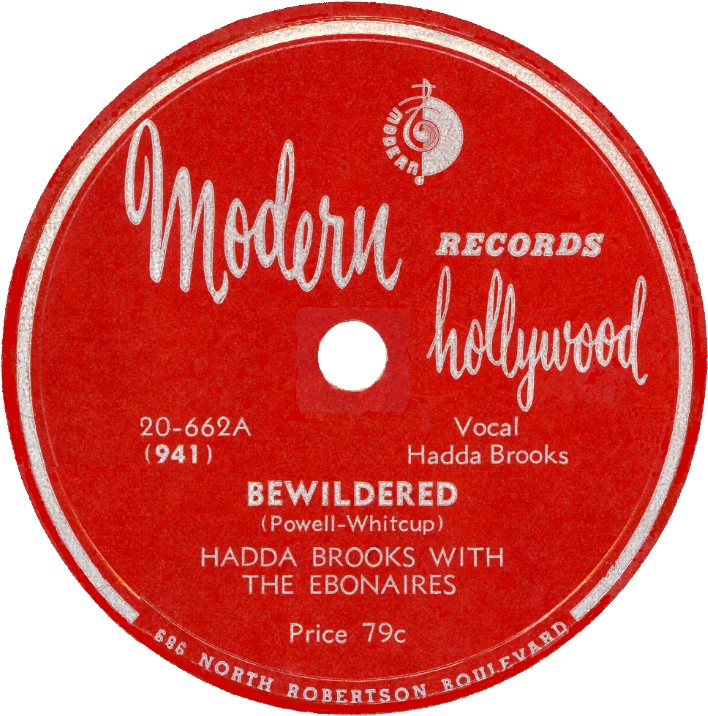
|
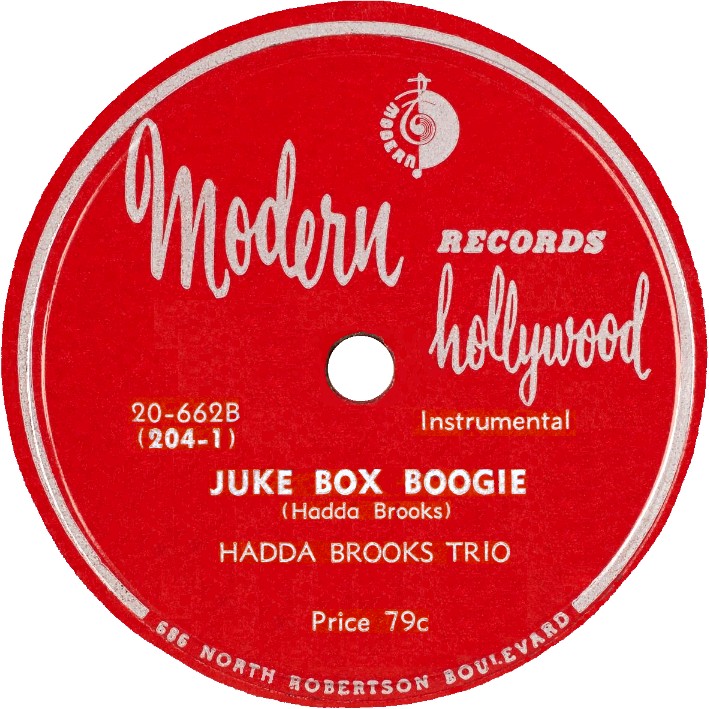
|
Above: Label images for both sides of Modern Records 20-662A/B, released in 1949. The Ebonaires are featured further down on this page. LISTEN (Windows Media Player): [Audio restoration by Dave Saviet.]
1. "Bewildered" - Hadda Brooks With The Ebonaires - Modern 20-662A - 1949.
2. "Juke Box Boogie" - Hadda Brooks Trio - Modern 20-662B - 1949.BOTH SONGS played in sequence.
At Right: NEW YORK AGE, October 1953. Hadda Brooks and The Ebonaires are on the same bill at The Apollo.
THE BILLBOARD, September 3, 1949: BROOKS VS. MODERN IN $193,000 SUIT
HOLLYWOOD—Pianist–singer Hadda Brooks clamped a $193,000 damage suit against Modern Records' topper, Jules Bihari, this week in a Superior Court action, charging Bihari with breach of contract and default on royalties. In her action, Miss Brooks said Modern owed her $88,000 in back royalties, had charged her $5,000 for disking expenses, and had violated a personal management pact which she claimed to have signed in 1945.Bihari told The Billboard that all royalties and fees due had been paid to date and approved by a certified public accountant employed to check Modern's books. Former contract with Miss Brooks, he said, had been between his brother, Joe Bihari, and the singer, but has since been voided.
Charges that the artist was billed for recording dates was also refuted, claiming that normal recording costs on Miss Brooks' dates were deducted from royalty statements in accordance with standard recording artist contracts as approved by American Federation of Musicians (AFM). No added charges or additional expenses were ever lifted from royalty checks, Bihari added.
THE BILLBOARD, April 8, 1950:
....Thrush Hadda Brooks, former Modern disk artist, has signed to record for London. She cuts her first sides this week....CASH BOX, November 3, 1951:
....HADDA BROOKS, the piano beauty, is currently gracing the bars across the country, since her picture was chosen to decorate posters for a major beer company....CASH BOX, February 9, 1952:
....Danny Kessler, Rhythm and Blues A & R man at Columbia has announced the signing of Hadda Brooks. Heís already cut a date with her on the coast and her first Okeh release will appear at the end of February....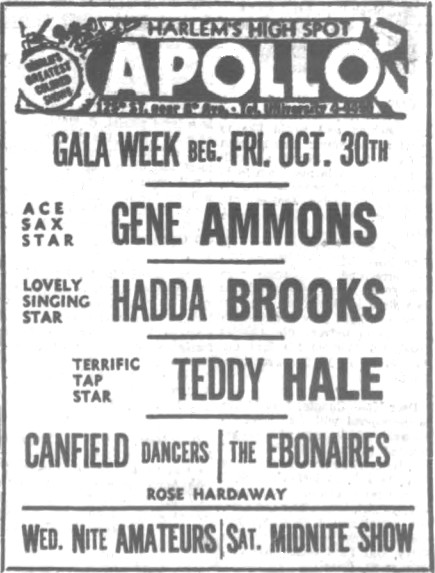
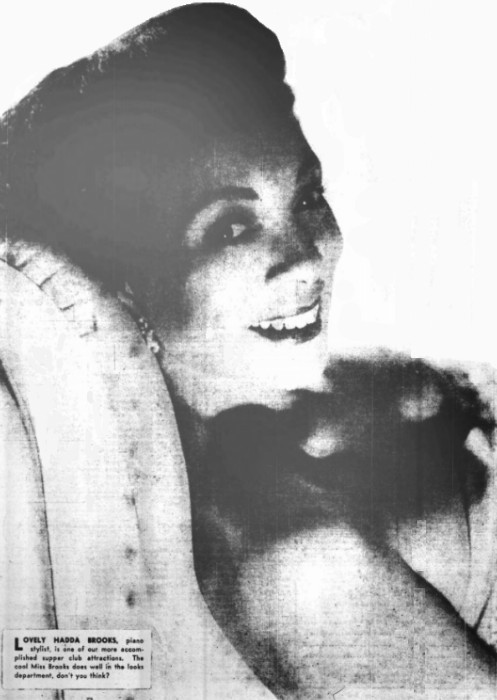
|
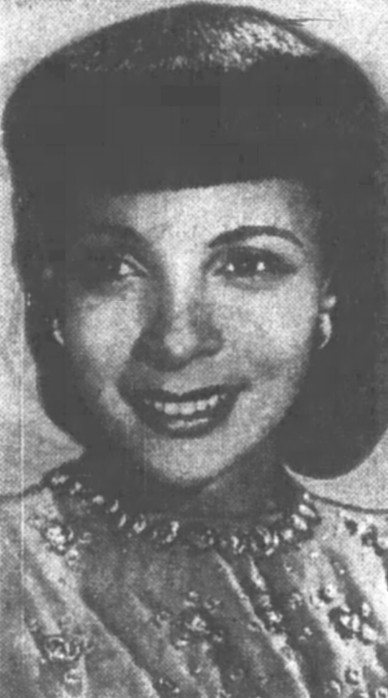
|
Above Left: PITTSBURGH COURIER, May 29, 1954:
Inscription: "LOVELY HADDA BROOKS, piano stylist, is one of our more accomplished supper club attractions. The cool Miss Brooks does well in the looks department, don't you think?"Above Right: OAKLAND TRIBUNE, September 13, 1951:
The exotic recording star and TV personality, Hadda Brooks, joined the passing parade of Black Hawk (San Francisco) entertainers this week. "I don't go in for vocal gymnastics", she told me. "I'm not a exaggerationalist. I'm a torchy person. I like love ballads. But they bore the public which wants fast, racy material. So I let 'em have it."
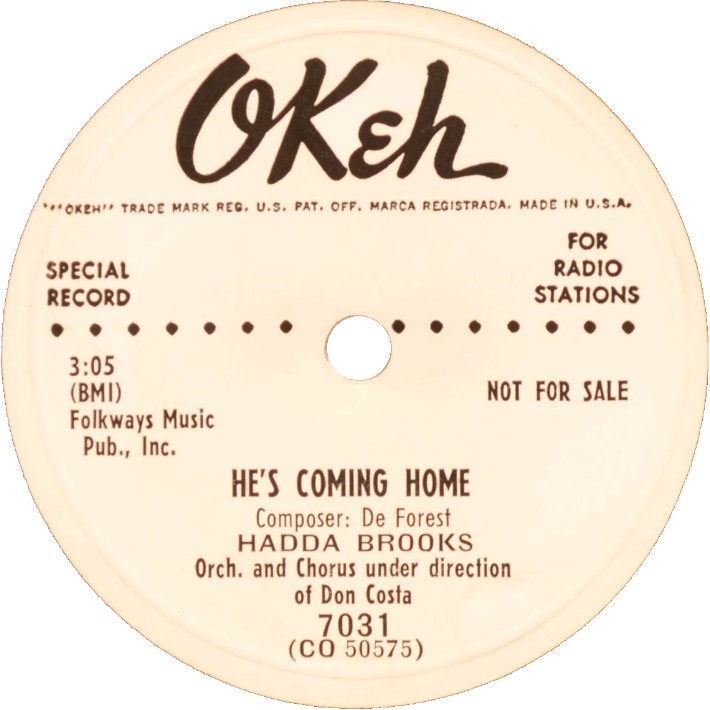
|
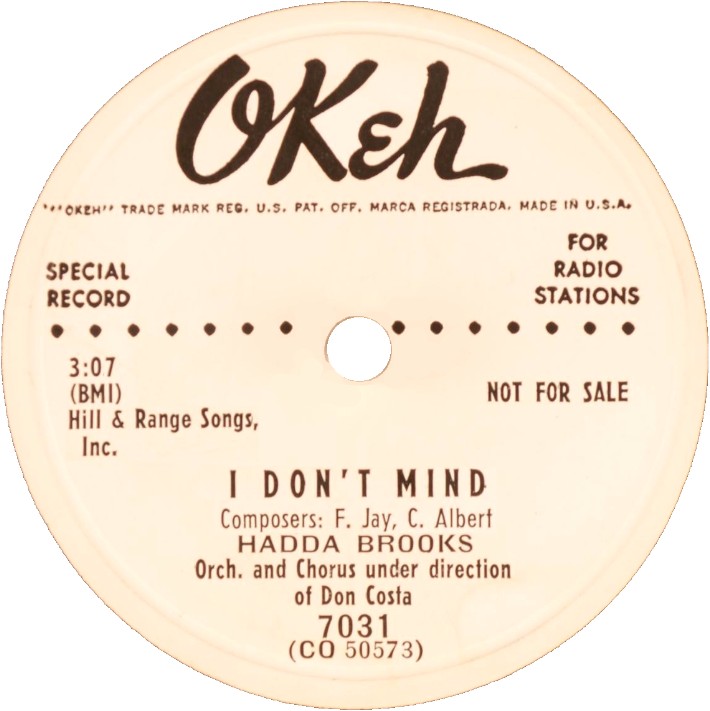
|
Above: Label images for both sides of Okeh 7031 Label Image, released in 1954. Hadda Brooks is backed by a vocal group on both sides. LISTEN (Windows Media Player): [Audio restoration by Dave Saviet.]
1. "He's Coming Home" - Hadda Brooks (And Vocal Group) - Okeh 7031 - 1954.
2. "I Don't Mind" - Hadda Brooks (And Vocal Group) - Okeh 7031 - 1954.BOTH SONGS played in sequence
CASH BOX, November 3, 1956: HADDA BROOKS RETURNS TO THE MODERN LABEL
HOLLYWOOD—Hadda Brooks, the first artist to record for the Modern label, returned to Modern last week. Flying in from Chicago, where she is currently appearing at the Black Orchid, the singer spent a week recording with Jules Bihari at Modernís Hollywood studios.A 12" LP of standards will feature the vocalist playing piano as well as singing, with additional backing provided by her own trio. Over the weekend, Miss Brooks visited the Los Angeles disk jockeys with dubs from the album, which received such tremendous reaction, that the album will be rushed into release early this month.
Formerly on the London and Mercury labels, the singer has spent the past two years in Europe appearing in various clubs on the Continent and on the British Isles.
(NOTE: Could not verify that Hadda released any records on the Mercury label.)THE BILLBOARD, November 3, 1956: HADDA BROOKS BACK WITH MODERN LABEL
HOLLYWOOD—Singer Hadda Brooks was reunited with the first recording company she waxed for here last week, when Modern Records inked Miss Brooks to a term recording contract. Chirp will cut both albums and singles, and will not be confined to rhythm and blues material.One of the early mainstays of the Modern firm more than 10 years ago, Miss Brooks recently waxed for Coral Records. She arrived here for recording sessions last week and later returned to Chicago, where she is currently appearing.
(NOTE: Could not verify that Hadda released any records on the Coral label.)LISTEN (Windows Media Player):
"Anytime, Anyplace, Anywhere" - Hadda Brooks - Crown LP CLP 5314 - 1957.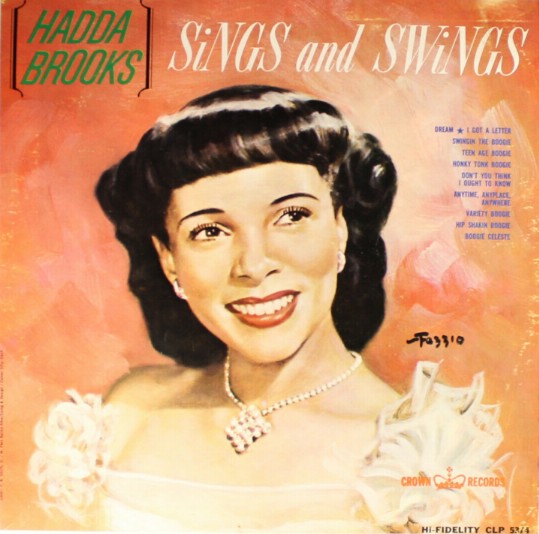
THE SONG "BEWILDERED": The song "Bewildered" was composed by Teddy Powell and Leonard Whitcup in 1936. It was a hit for Tommy Dorsey And His Orchestra in 1938. Mildred Bailey also recorded the song that year.
"Bewildered" was revived in 1948-1949 in the rhythm and blues field. In those years, it was recorded by The Red Miller Trio (Bullet), Amos Milburn (Aladdin), Lonnie Johnson (King), Joe Medlin And The Three Riffs (Atlantic), Billy Eckstine (M-G-M), The James Quintet (Coral), Herb Jeffries (Columbia), The Ink Spots (Decca), The Vocalaiers (Sensation), and Hadda Brooks With The Ebonaires (Modern).
LISTEN (Windows Media Player):
"Bewildered" - The Vocalaiers - Sensation 10 - 1949.The flip-side of Sensation 10 is "Grandfather's Clock". This group would have one more record on Sensation 27 in February 1950, but as "The Vocalaires", singing "The Preacher And The Bear" and "Swing Low Sweet Chariot".
The artists featured in this section are Amos Milburn, Joe Medlin And The Three Riffs, Lonnie Johnson, Billy Eckstine, and The Ink Spots. The Hadda Brooks/Ebonaires' version is further up on this page. The labels for Milburn and Medlin do not credit any composers.
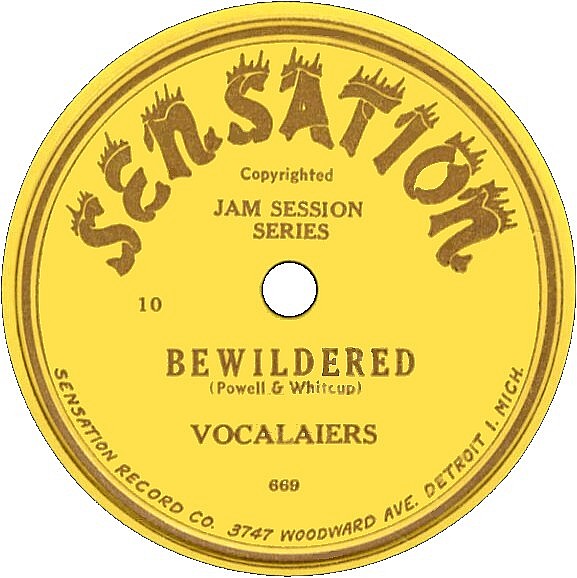
AMOS MILBURN:
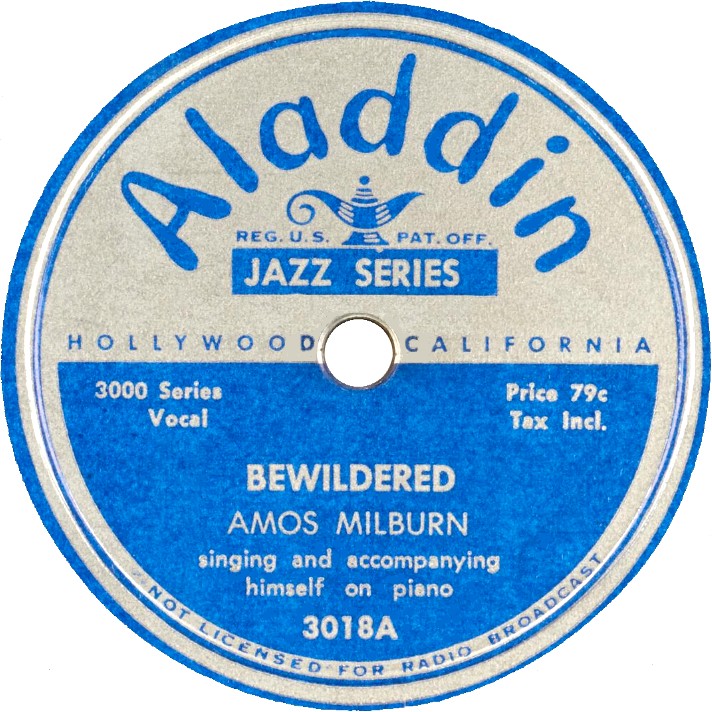
|
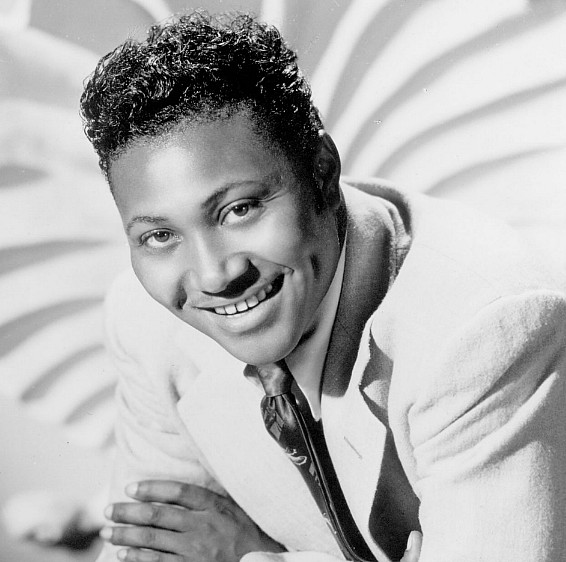 |
Above Left: Label image for Aladdin 3018A, released in 1948. Above Right: Photo of Amos Milburn, who was a singer, pianist, bandleader, and composer. He recorded for Aladdin Records from 1946 to 1957. Maxwell Davis, the great tenor saxophonist and orchestra leader, stayed with Amos throughout their stay at Aladdin.
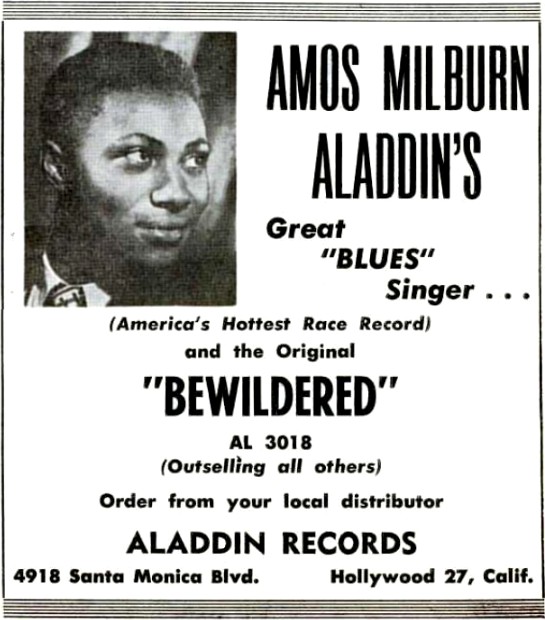
|
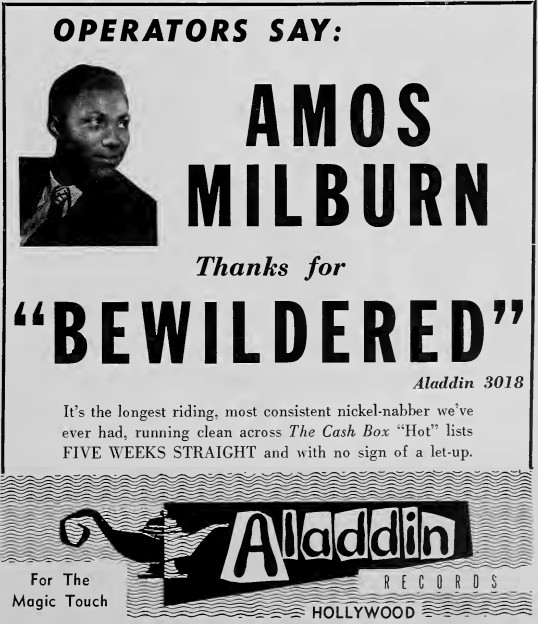
|
Above Left: THE BILLBOARD, December 4, 1948.
NOTE: Bullet Records claimed that the Red Miller Trio version of the song was the original. It seems that both records' release dates are very close.Above Right: CASH BOX, February 5, 1949.
LISTEN (Windows Media Player): [Audio restoration by Dave Saviet.]
"Bewildered" - Amos Milburn - Aladdin 3018A - 1948.CASH BOX, December 11, 1948:
....Eddie Mesner is jumping with joy over the double hit that brother Leo had released on their Aladdin label in Amos Milburnís "Bewildered" and "Chicken Shack Boogie". The pair, now crowding each other for one-two on the Hot on Central Avenue list and a cinch to sweep the nationís race charts, are a nice break for the Mesner Boys and for great blues artist Milburn, who is just coming into his own....CASH BOX, January 22, 1949:
....Ran into Ben Bart, prexy of Universal Attractions, who seems to be cooking hotter than a ten dollar pistol with The Ravens and Dinah Washington running wild. Incidentally, Ben has a wonderful piece of property in Amos Milburn, who currently is running all over the place as his "Bewildered" continues to garner top position in "race" spots throughout the nation....
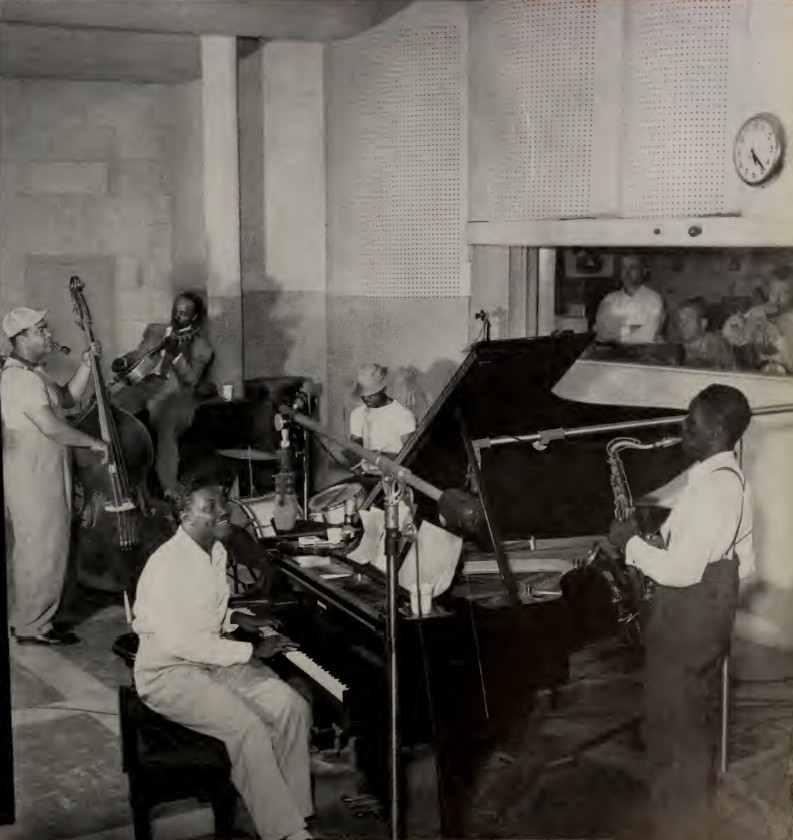
|
Above: CASH BOX COVER, September 10, 1949:
Caption: Amos Milburn, Aladdin Records' great blues artist of "Hold Me, Baby" and "In The Middle Of The Night" fame, is at it again in this recent session sure to produce several more hits for the Mesner Brothers' enterprising disk firm. Giving out at the ivories is Amos, with saxophonist-arranger Maxwell Davis standing by.Amos' string of click recordings have resulted in peak juke box play for operators throughout the nation. Latest wax by Milburn is "Walkin' Blues" and "Roomin' House Boogie", soon to be released. Milburn is currently engaged in a nationwide personal appearance and theater tour.
The fellow directing in the sound booth is the plattery's vee-pee Eddie Mesner. Amos Milburn is exclusively featured on Aladdin Records. (NOTE: A great, rare look during an actual recording session.)
JOE MEDLIN AND THE THREE RIFFS:
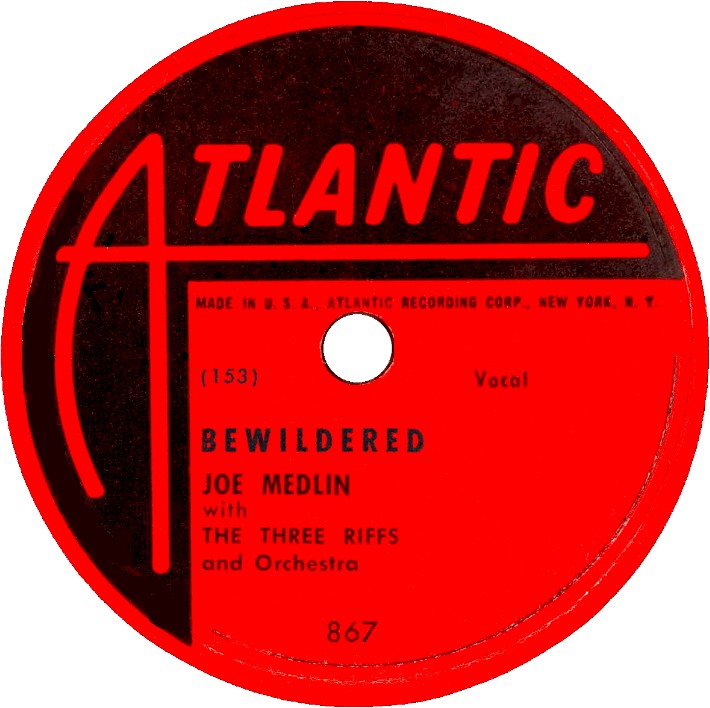
|
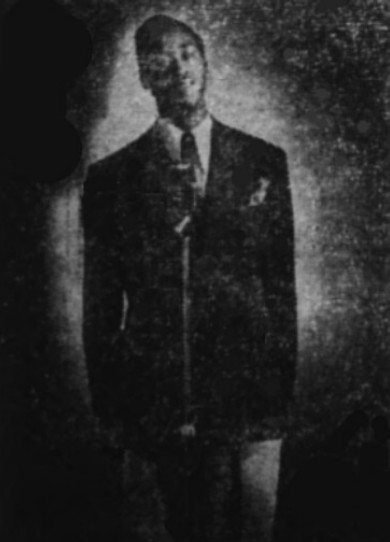 |
Above Left: Label image for Atlantic 867, recorded on November 23, 1948 and released in December 1948. Atlantic 867 was reissued in February 1949 with "My Last Goodbye" (recorded on October 21, 1948) replacing "Bewildered". The Three Riffs had one release on Atlantic (1949) on their own. Above Right: INDIANAPOLIS RECORDER, January 22, 1944:
Joe Medlin, featured vocalist with Buddy Johnson's Famous Orchestra, who is spotlighted with the great band that last week played to a record crowd at Harlem's Savoy Ballroom. Medlin is thrilled with "They All Say I'm The Biggest Fool", his latest Decca recording. (NOTE: Joe Medlin went to the Decca label in 1952.)LISTEN (Windows Media Player): [Audio restoration by Dave Saviet.]
"Bewildered" - Joe Medlin And The Three Riffs - Atlantic 867 - 1948.The Billboard Review (1-1-49):
JOE MEDLIN WITH THE THREE RIFFS — ATLANTIC 867
Bewildered (80) Good enough performance of tune that's clicking via a Bullet waxing. Could pick up overflow coin.
(NOTE: Ratings had a range of 0-100 with 80-89 considered as "excellent".)
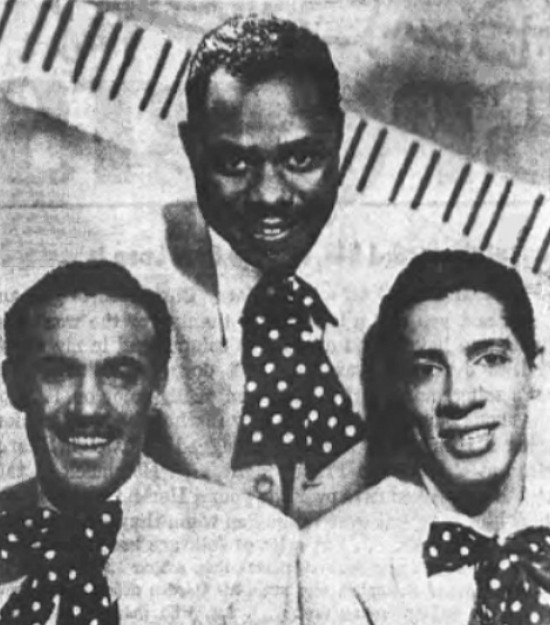
|
Above: NEW YORK AGE, December 25, 1948:
BEBOP TIES and all, The Three Riffs, in the usual order, are [L-R] Eddie Parton, Joel McGhee and Bunny Walker, who were Willie Bryant's guests last week on his famed disc show via WHOM. You've heard them as the background of Joe Medlin's latest record and they also backed up Manhattan Paul on his recently released "I Wish I Didn't Love You So" and "Hard Ridin' Mama". (NOTE: Their Manhattan Paul record is also on the Atlantic label.)
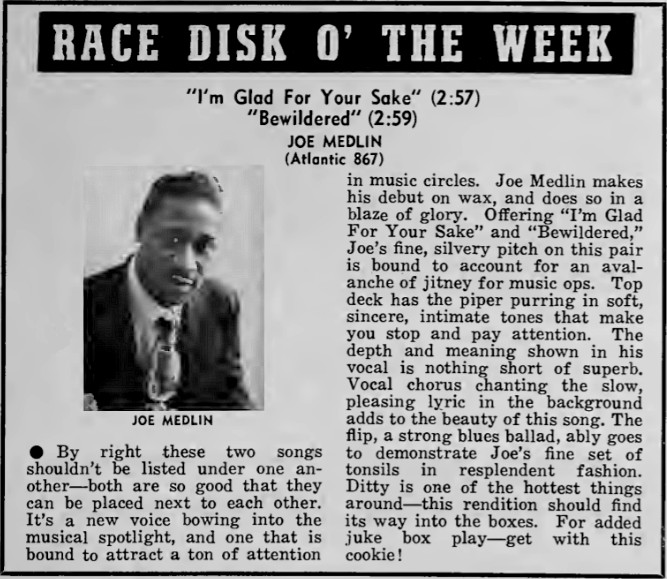
|
The Billboard Review (1/1/49):
JOE MEDLIN WITH THE THREE RIFFS
Bewildered (80) Good enough performance of tune that's clicking via a Bullet waxing. Could pick up overflow coin.
(NOTE: Ratings had a range of 0-100 with 80-89 considered as "excellent".)THE BILLBOARD, January 1, 1949:
....Atlantic Records has signed Joe (I'm Glad for Your Sake) Medlin to a two-year exclusive wax pact....
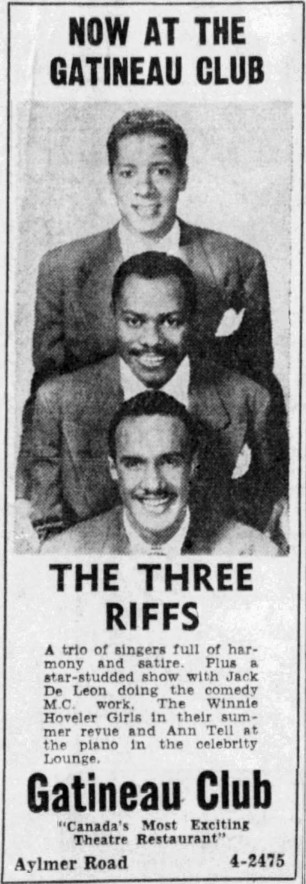
|
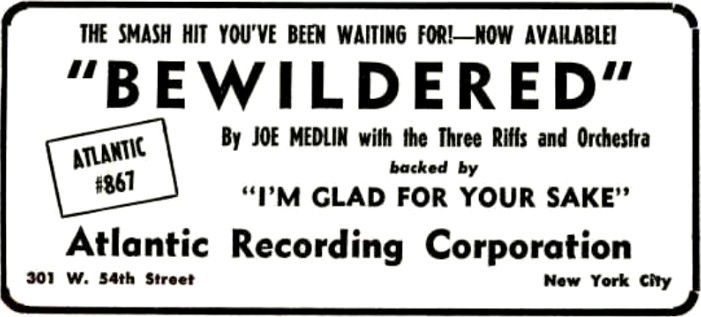
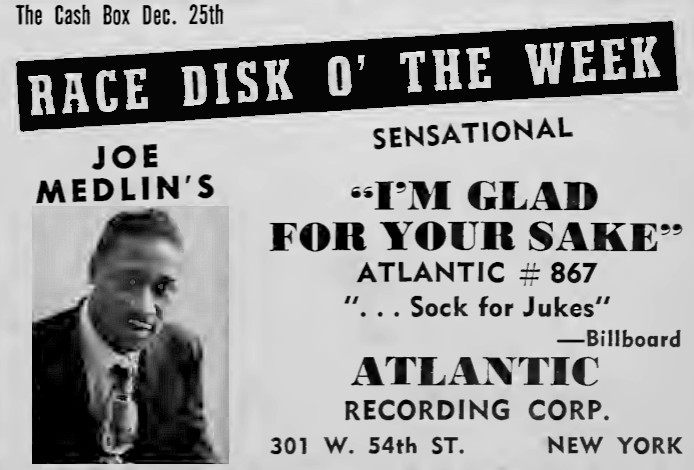
|
Above Left: OTTAWA CITIZEN, June 17, 1950. Above Right Top: THE BILLBOARD, December 4, 1948.
Above Right Bottom: CASH BOX, January 15, 1949.
LONNIE JOHNSON:
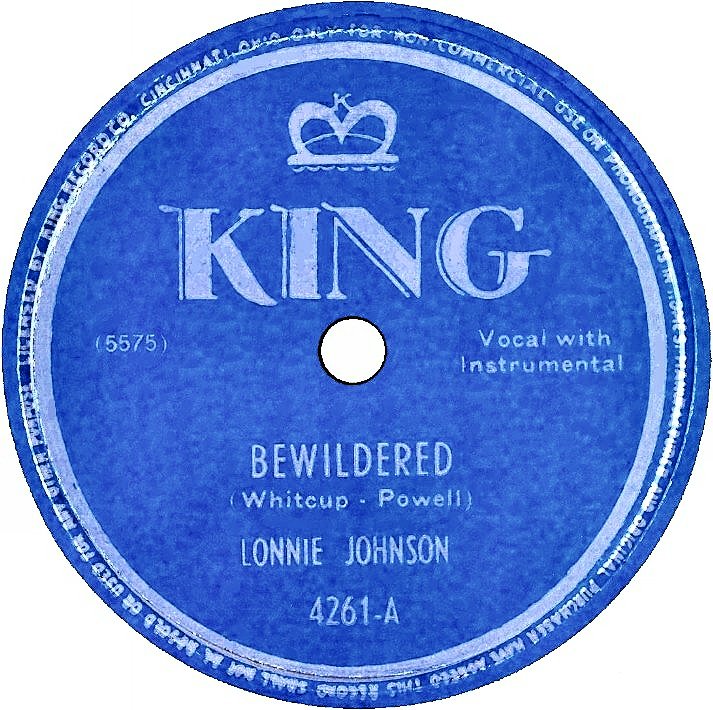
|
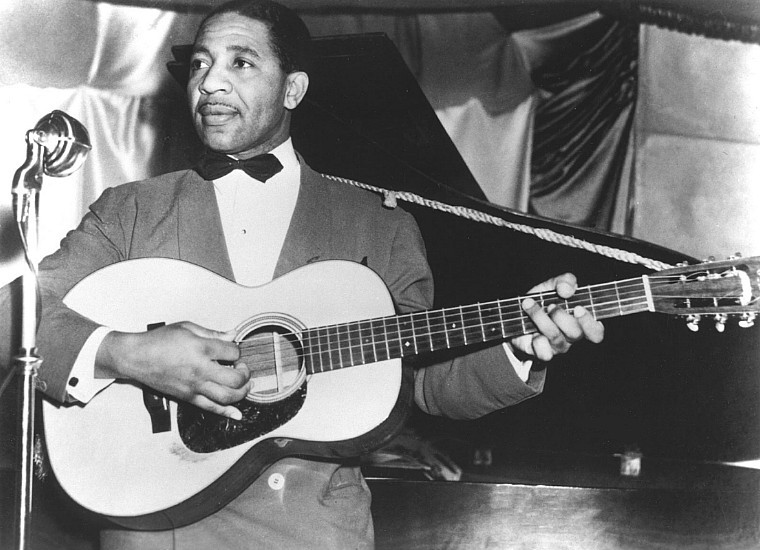
|
Above Left: Label image for King 4261-A, released in 1948. Above Right: Photo of Lonnie Johnson, who was a singer, guitarist, violinist, and songwriter. He joined King Records in 1947 and had a productive stay with them until 1951. Lonnie's first record on King, "Tomorrow Night", released in early 1948, was his biggest hit. Lonnie had previously recorded the song, which was released on Detroit's Paradise Records.
LISTEN (Windows Media Player): [Audio restoration by Dave Saviet.]
"Bewildered" - Lonnie Johnson - King 4261-A - 1948.The Billboard Review (1-22-49):
LONNIE JOHNSON — KING 4261
Bewildered (80) Fine, relaxed warbling and plectrum-plucking on the strong sleeper tune figures to garner hefty share of tune's coin.
(NOTE: A plectrum is the object held in or worn on the fingers to pluck the strings of an instrument.)
(NOTE: Ratings had a range of 0-100 with 80-89 considered as "excellent".)
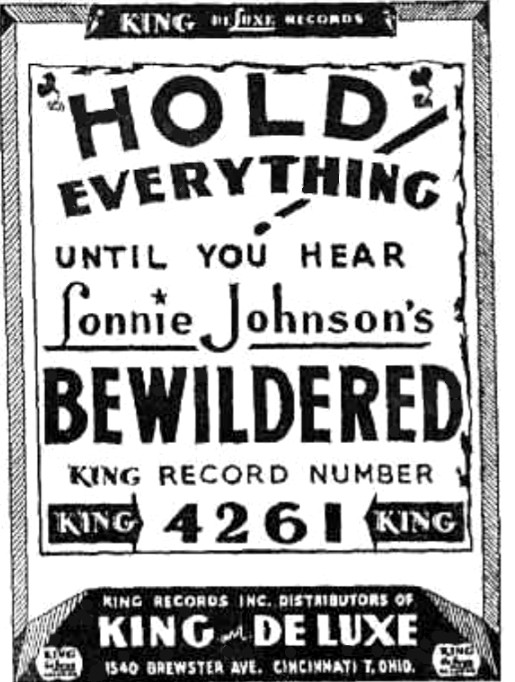
|
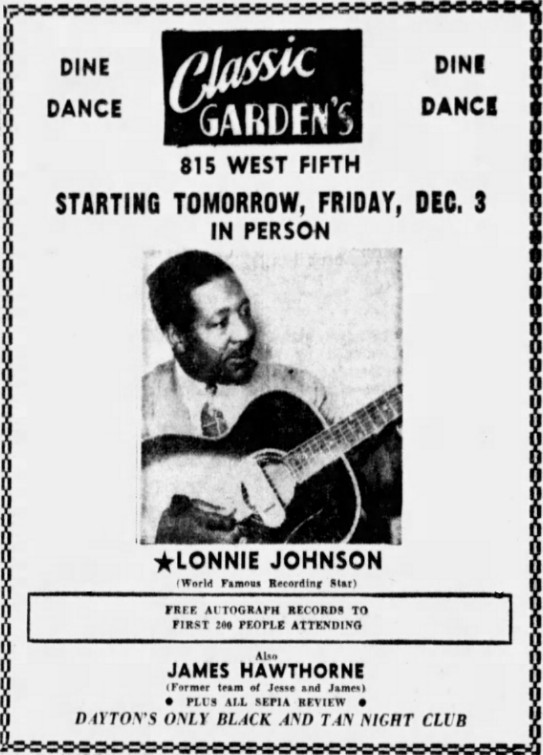
|
Above Left: THE BILLBOARD, November 27, 1948. Above Right: DAYTON DAILY NEWS, December 2, 1948.
NOTE: James Hawthorne was a specialty performer, spinning huge trays while tap dancing, leaping from ladder ending in split, etc.
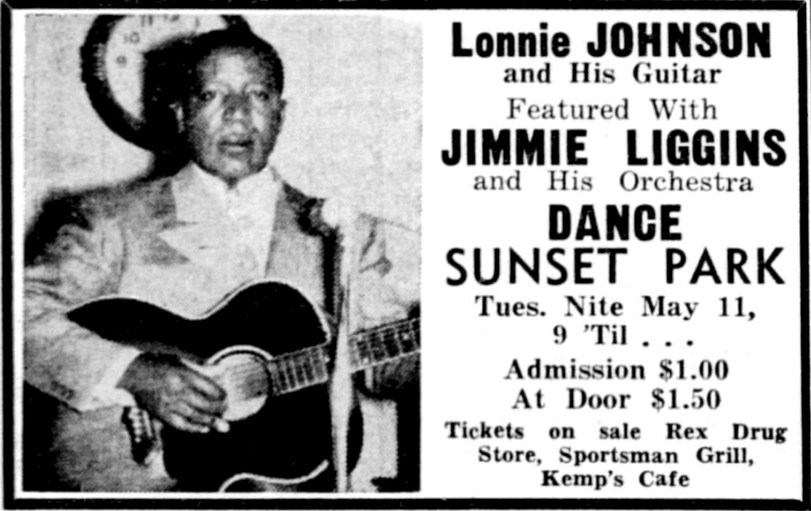
|
Above: CHARLOTTE NEWS, May 7, 1948.
BILLY ECKSTINE WITH THE QUARTONES:
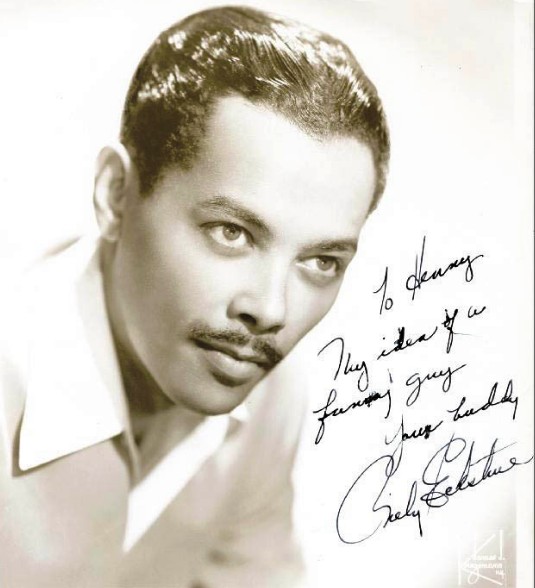
|
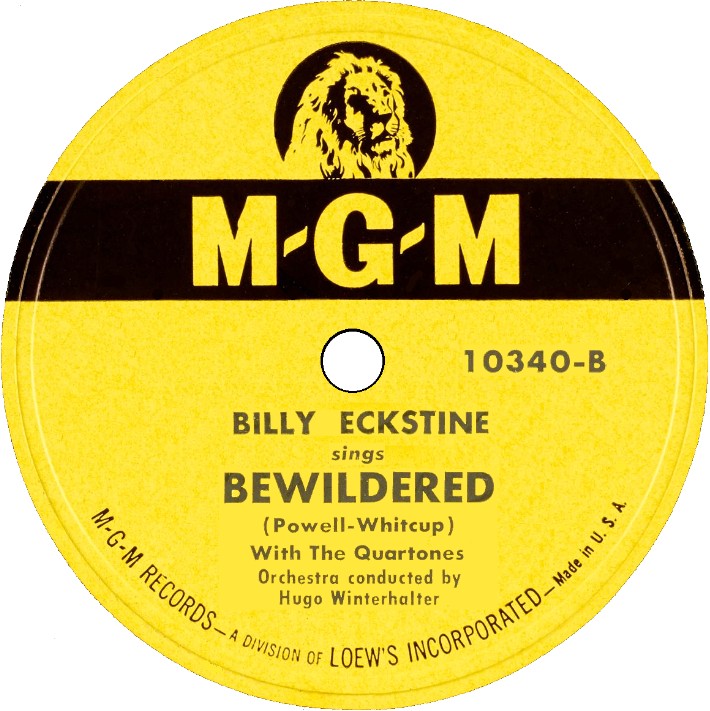
|
Above Left: Photo of Billy Eckstine. He had at least twenty-two records released on National Records from 1945 to 1950. Most of these were by "Billy Eckstine And His Orchestra" or "Billy Eckstine And His Octet". Billy joined M-G-M Records in 1947 resutlting in an incredible sixty-six records on that label before leaving in 1955. That totals eighty-eight records in ten years for the busy crooner.
Above Right: Label image for M-G-M 10340-B, released in 1949. Billy is backed vocally by his usual group, The Quartones. This vocal group backed Billy on fourteen of his M-G-M sides (1947-1952).
The Quartones also backed Bob Houston, Monica Lewis, Judy Valentine, and Art Lund on the M-G-M label (1947-1951).
LISTEN (Windows Media Player): [Audio restoration by Dave Saviet.]
"Bewildered" - Billy Eckstine And The Quartones - M-G-M 10340-B - 1949.The Billboard Review (1-22-49):
BILLY ECKSTINE — M-G-M 10340
Bewildered (87) Should be a big record for Billy. It's a currently favored race ditty which he does with conviction with aid from a vocal group and a tasteful Hugo Winterhalter orking.
(NOTE: Ratings had a range of 0-100 with 80-89 considered as "excellent".)THE BILLBOARD, June 4, 1949: BILLY ECKSTINE HITTING TOP; YEAR'S GROSS MAY REACH 500G
NEW YORK—Instigated by a series of fast-moving wax works, singer Billy Eckstine's gross income for the year may hit the half-million dollar mark, according to trade estimates. For many years recognized as a top singer, Eckstine in the past few months has succeeded in breaking thru race barriers in many portions of the nation to establish himself as a hot box-office item....The underlying success factor is Eckstine's string of hit wax on the MGM label now, and earlier on National platters. MGM execs credit Eckstine as the firm's most consistent disk seller. Bewildered, the disk most immediately responsible for his boom, has topped the 300,000 mark in sales....

|
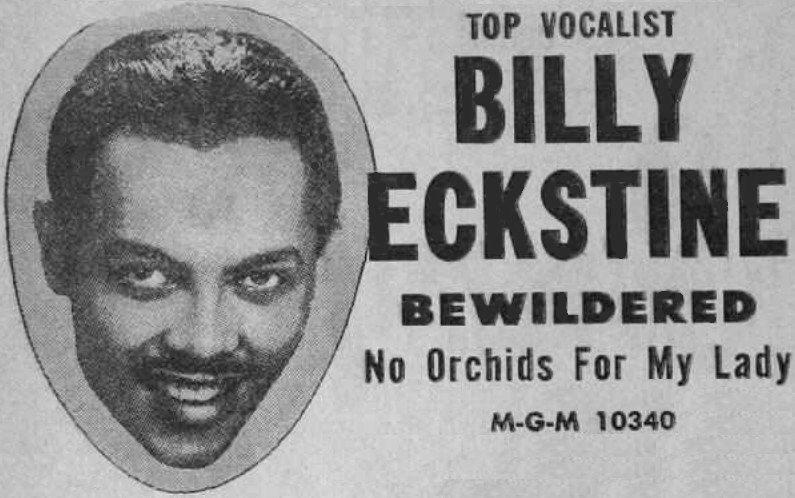
|
Above: THE BILLBOARD, January 29, 1949.
THE INK SPOTS:
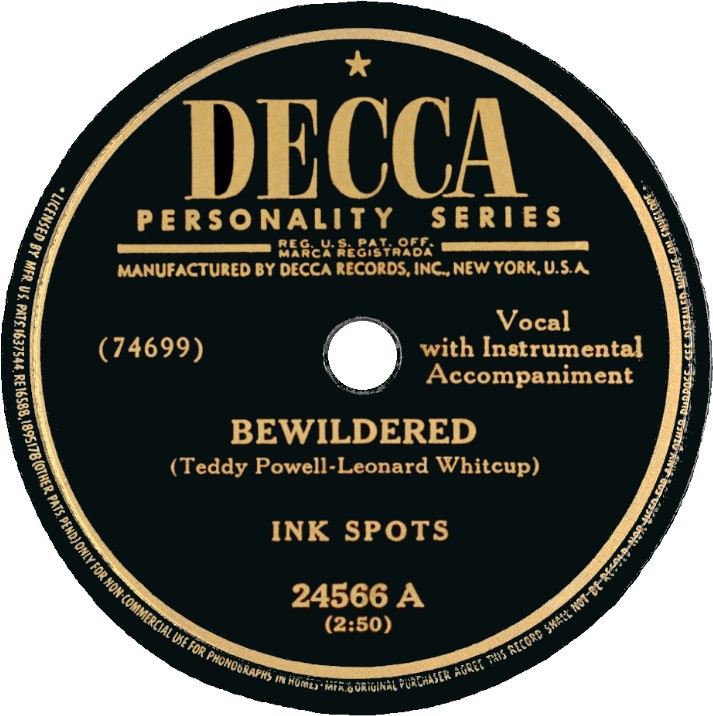
|
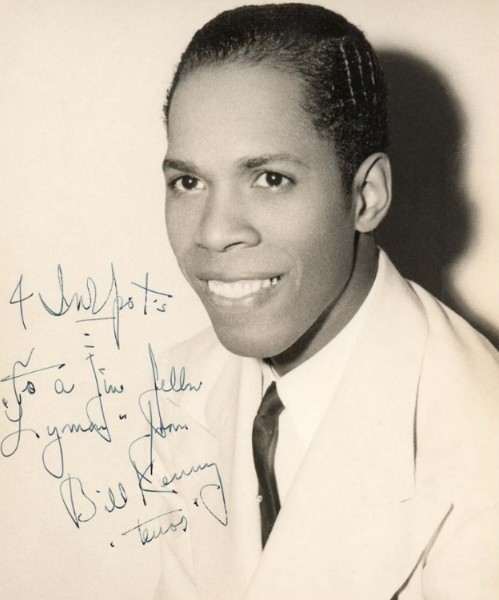
|
Above Left: Label image for Decca 24566 A, recorded on January 19, 1949 and released in 1949. The flip-side of this record is "No Orchids For My Lady", the same as the Billy Eckstine "Bewildered" record. Above Right: Photo of Bill Kenny. [Photo is courtesy of Hans-Joachim Krohberger.]
LISTEN (Windows Media Player): [Audio restoration by Dave Saviet.]
"Bewildered" - The Ink Spots - Decca 24566 A - 1949.Cash Box Review (2-26-49):
THE INK SPOTS — DECCA 24566 No Orchids For My Lady/Bewildered (NOTE: Listing the "B" side first.)
Pair of tunes by the Ink Spots, long missing from the juke box spotlight, are these items tagged "No Orchids For My Lady" and "Bewildered".Both tunes are currently popping heavily in the phonos [juke boxes] and should be fairly well known to music ops. Top deck is handled effectively by Billy Kenny and his lads, with some nice harmony sifting throughout.
The flip, a heavy click in so many spots, is treated in the usual manner of the Spots and should hold its own. Ops might listen in.
The Billboard Review (2-26-49):
THE INK SPOTS — DECCA 24566
Bewildered (84) Spots are in the groove for this one. Release would be late for most other performers, but Group has faculty of scoring with already established material.
(NOTE: Ratings had a range of 0-100 with 80-89 considered as "excellent".)CASH BOX, January 17, 1948: THE INK SPOTS
Top male vocal combo of the nation for two successive years. The Ink Spots and their Decca Records have been continual musts in juke boxes throughout the nation. Piloted by Billy Kenny, the group recently set smash attendance records during their tour through England.
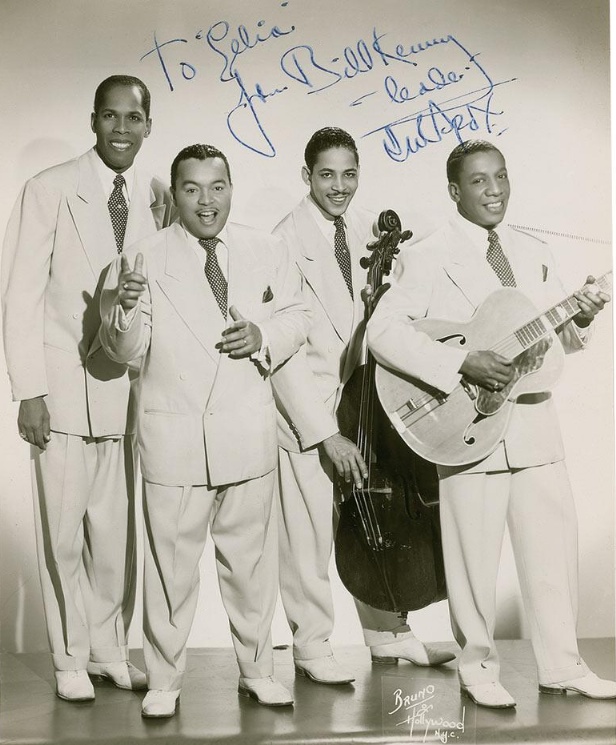
|
Above: Photo of The Ink Spots, (L-R) Bill Kenny (lead tenor), Billy Bowen (tenor), Herb Kenny (bass), and Charlie Fuqua (baritone). These are the group members on their "Bewildered" recording.
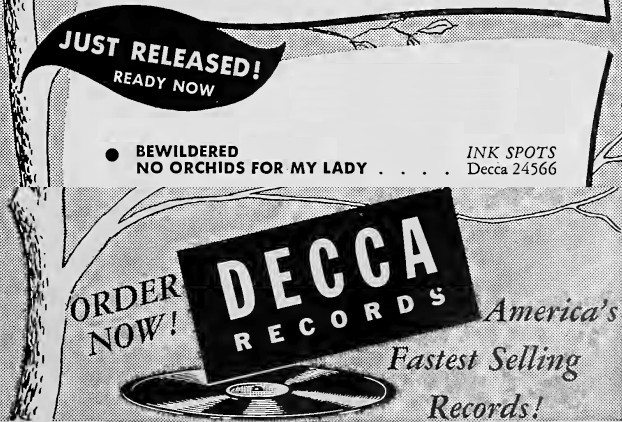
|
Above: CASH BOX , February 26, 1949.
NOTE: Four of the following versions of "Bewildered" were reviewed by The Billboard. All earned a rating of "80" or greater (excellent). Billy Eckstine received the highest rating, that an "87".
LISTEN TO ALL SEVEN VERSIONS (Windows Media Player): [Audio restoration by Dave Saviet.]
1. "Bewildered" - Hadda Brooks With The Ebonaires - Modern 20-662A - 1949.
2. "Bewildered" - The Vocalaiers - Sensation 10 - 1949.
3. "Bewildered" - Amos Milburn - Aladdin 3018A - 1948.
4. "Bewildered" - Joe Medlin And The Three Riffs - Atlantic 867 - 1948.
5. "Bewildered" - Lonnie Johnson - King 4261-A - 1948.
6. "Bewildered" - Billy Eckstine And The Quartones - M-G-M 10340-B - 1949.
7. "Bewildered" - The Ink Spots - Decca 24566 A - 1949.ALL SEVEN SONGS played in sequence.
THE EBONAIRES: The Ebonaires were also known as "The Miltones". The Miltones recorded for Roy Milton's Miltone label in 1947. Their "3 O'Clock In The Morning", released on Miltone 213 in 1947, is included further down on this page. The Ebonaires recorded this same song for Aladdin in 1953.
An article in the California Eagle from March 1948 names The Ebonaires' members as John Dix, bass; James Bradley, baritone; Reuben Vaughn, second tenor; and Charles McCladdie, first tenor.
The Honolulu Bulletin dated July 6, 1953, gives the members' names as Charles Grose, Ray Wheaton, John Dix, James Bradley, and Edward Jones, pianist-arranger. Ray Wheaton had been with Dusty Brooks And His Four Tones from 1944 to at least 1950.
On Modern Records, they had one record plus one side backing Hadda Brooks. On Modern's subsidiary label, Colonial, they had one record, which is featured in Part Two of this article. However, The Ebonaires did have one other record on the Colonial label, but as The Miltones. As reported in the August 28, 1948 edition of The Billboard, "....First Colonial releases will be "California Waltz" and "Cucomonga", waxed by The Miltones vocal group with ork backing...."
The Ebonaires had releases on Crystal (1948), Modern (1949), Colonial (1948-49), M-G-M (1949), Aladdin (1953-54), and Money (1956). Also, on records, they vocally backed up Clark Butler (Maestro, 1946), Hadda Brooks (Modern, 1949), Billy Day (Modern, 1949), Johnny Lee (Columbia, 1949), Monette Moore (Columbia, 1949), and Freddy Jackson (Hollywood, 1955-56)
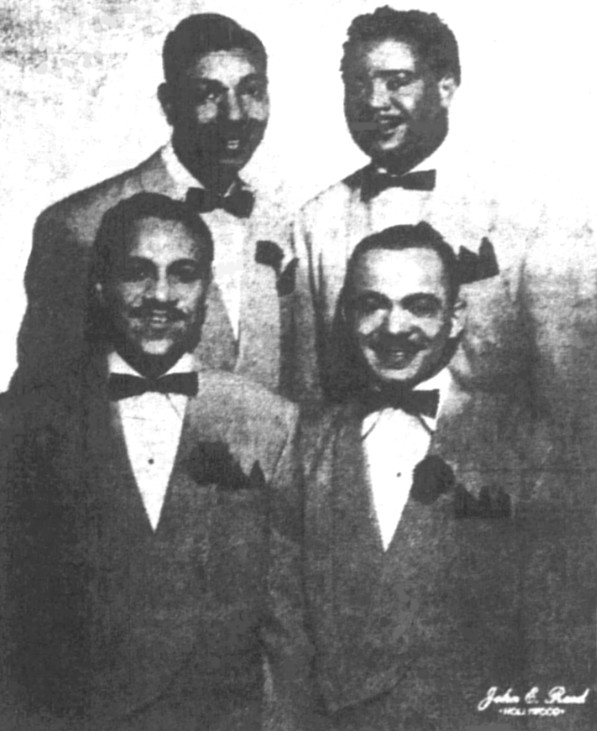
|
Above: CALIFORNIA EAGLE, March 11, 1948: ON NEW SIDES
Now recording exclusively for Crystal Recording Company, the up and coming Ebonaires have recently waxed off these sure hits, "What Do I Do On Sunday", "Bye, Bye, Bye, Bye", and "Doll House".Their last appearance was at Larry Potter's Supper Club in San Fernando Valley and they have performed at many fashionable spots on the coast. They have also made guest appearances on benefit theatre shows, special television shows, and with popular disc jockeys on radio programs. The versatility of the group is expressed in their blues, hillbilly, jump, and barbershop numbers.
Featured are John Dix, bass; James Bradley, baritone; Reuben Vaughn, second tenor; and Charles McCladdie, first tenor.
NOTE: In the above picture: (L-R Top) John Dix, James Bradley; (L-R Bottom) Charles McCladdie, Reuben Vaughn.)
NOTE: "Bye Bye, Bye Bye" was purchased by M-G-M and released on their label in 1949. That M-G-M record is included further down in this section.)
CALIFORNIA EAGLE, May 15, 1947: ....Watch the Miltones...they are a group of fellas that will sing their way right into your hearts....
CALIFORNIA EAGLE, June 5, 1947: UP-AND-COMING
One of the most talented young quartets in the city, the Miltones, have found favor wherever they have appeared. They will be heard soon on the stage of the Lincoln Theatre. Their recordings are fast becoming juke-box favorites....
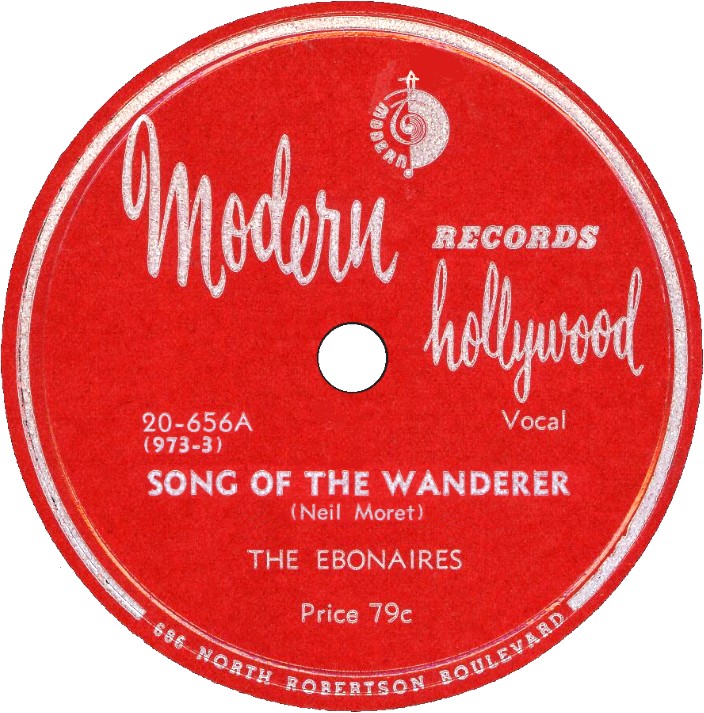
|
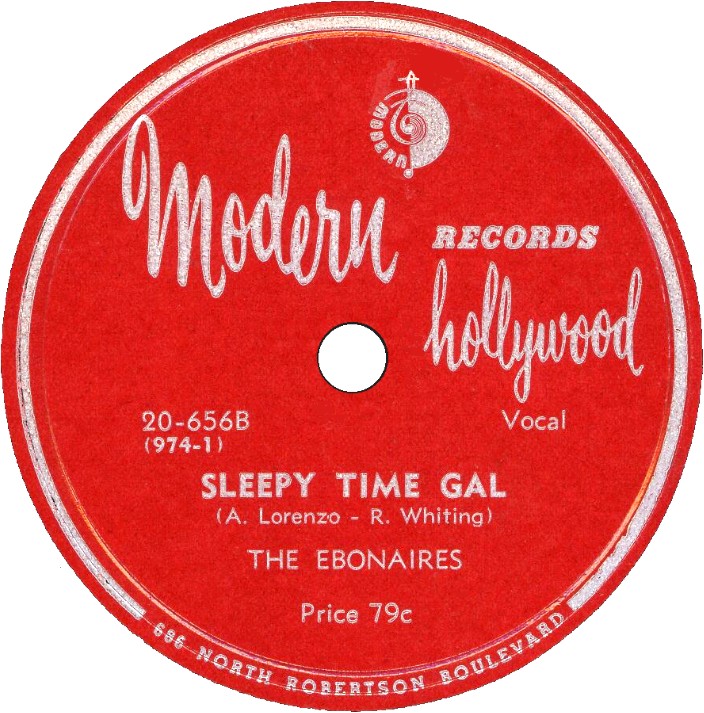
|
Above: Label images for both sides of Modern Records 20-656A/B, released in April 1949. LISTEN (Windows Media Player): [Audio restoration by Dave Saviet.]
1. "Song Of The Wanderer" - The Ebonaires - Modern 20-656A - 1949.
2. "Sleepy Time Gal" - The Ebonaires - Modern 20-656B - 1949.BOTH SONGS played in sequence.
EXTRA RECORDS — THE EBONAIRES:
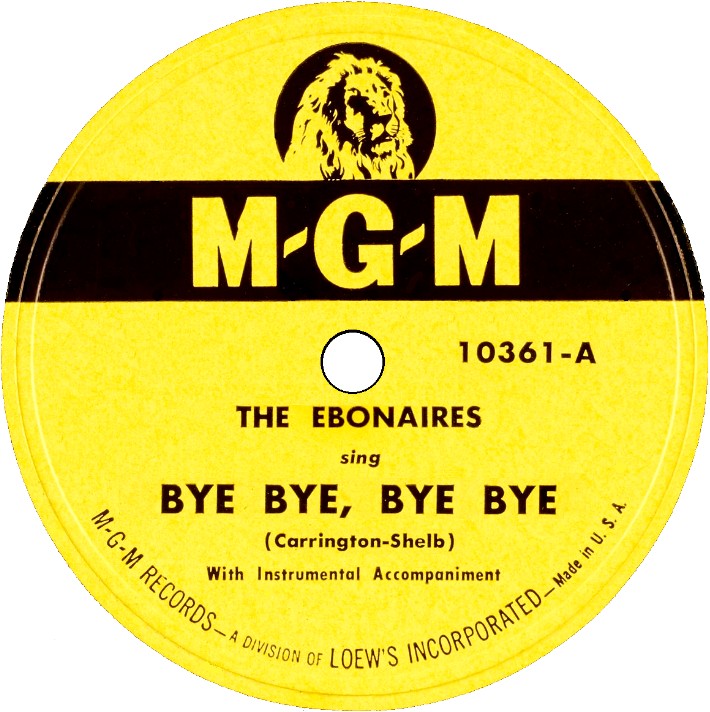
|
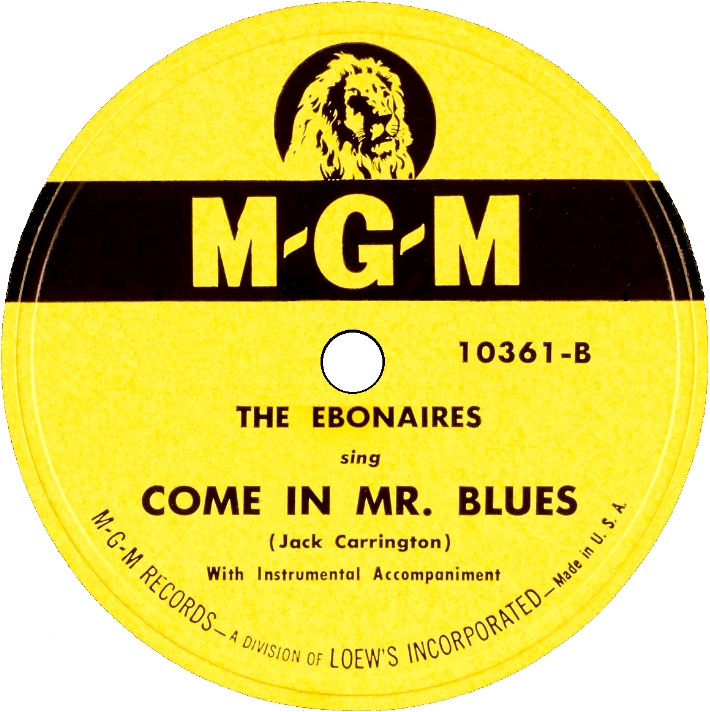
|
Above: Label images for both sides of M-G-M 10361-A/B, released in February 1949. Per Disco-File, the masters for both sides were purchased in January 1949 from Jean Aberbach [a male; music publisher]. LISTEN (Windows Media Player): [Audio restoration by Dave Saviet.]
1. "Bye Bye, Bye Bye" - The Ebonaires - M-G-M 10361-A - 1949.
2. "Come In Mr. Blues" - The Ebonaires - M-G-M 10361-B - 1949.BOTH SONGS played in sequence.
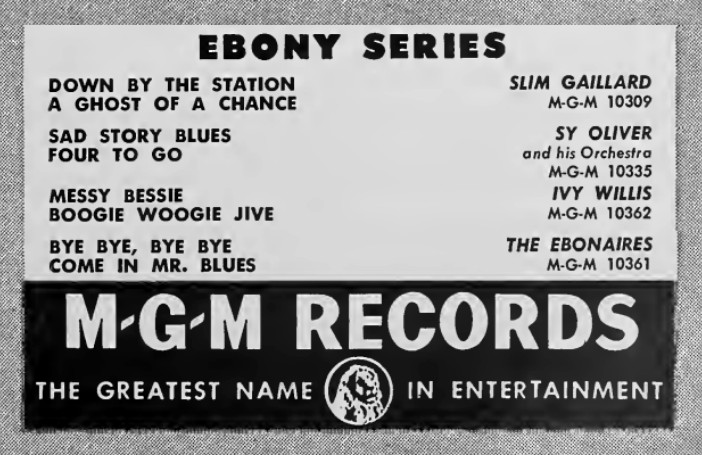
|
Above: CASH BOX, February 26, 1949.
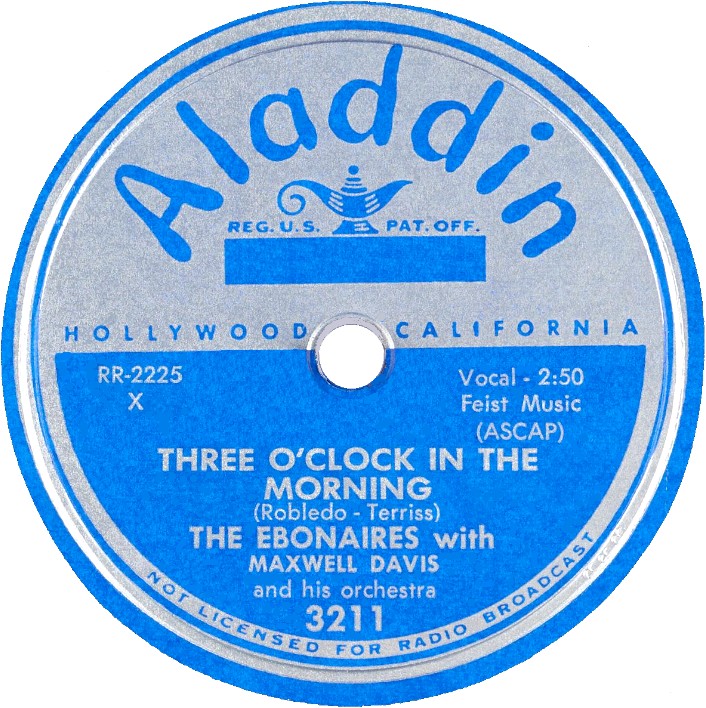
|
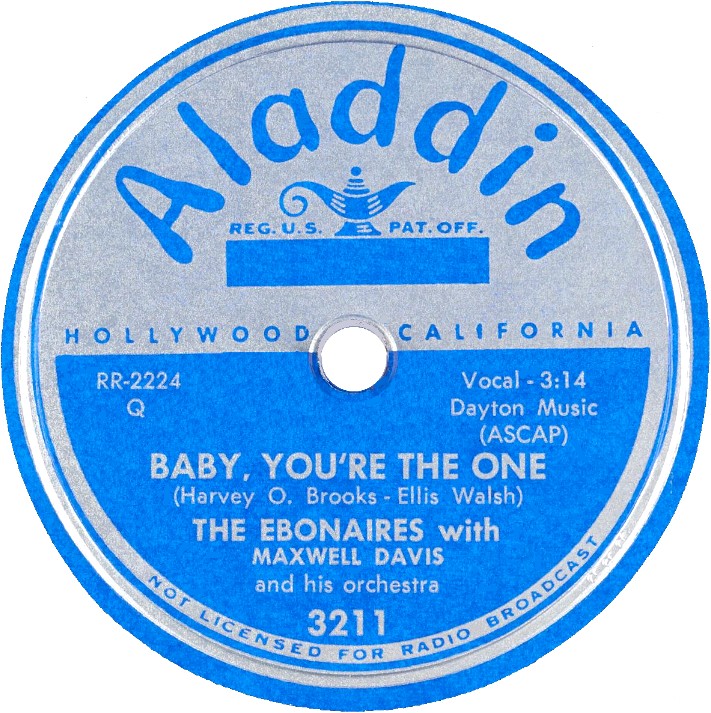
|
Above: Label images for both sides of Aladdin 3211, recorded on September 28, 1953 and released in October 1953. LISTEN (Windows Media Player): [Audio restoration by Dave Saviet.]
1. "Three O'Clock In The Morning" - The Ebonaires - Aladdin 3211 - 1953.
2. "Baby, You're The One" - The Ebonaires - Aladdin 3211 - 1953.BOTH SONGS played in sequence.
CASH BOX, October 24, 1953:
....Leo and Eddie Mesner [Aladdin Records owners] are excited over their latest release with the Ebonaires singing "Baby Youíre the One" and "Three OíClock in the Morning" on Aladdin....CASH BOX, November 14, 1953:
....Joe Glaser [booking agent] signed The Ebonaires after watching them knock the Apollo audience cold....The Billboard Review (11-7-53):
THE EBONAIRES - MAXWELL DAVIS — ALADDIN 3211
Baby, You're The One (75) Lead singer is backed nicely by the Maxwell Davis combo in this light, poppish material. He is relaxed and delivers the lyrics with feeling and style. There's a cute gimmick here that deejays ought to watch; just as the record is at an end, it begins all over again, like the old Count Basie arrangements.
Three O'Clock In The Morning (74) This tune, currently stirring up some action in the pop market, is given a smooth and mellow reading by the group with Davis again out front. Like the flip, designed to appeal easily to both r. & b. and pop markets.
(NOTE: Ratings had a range of 0-100 with 70-79 considered as "good".)Cash Box Review (11-7-53):
THE EBONAIRES - MAXWELL DAVIS — ALADDIN 3211
Baby, You're The One (B) The Ebonaires dish up a middle tempo bounce in which the lead unhappily sings of his emotional state resulting from a set-to with this lady love.
Three O'Clock In The Morning (C+) Currently revived via Monte Kellyís lush instrumental, The Ebonaires make a pitch for the R & B market. A lovely tune with a sweet and mellow treatment.
(NOTE: A rating of C+ was considered as "good" and B as "very good".)
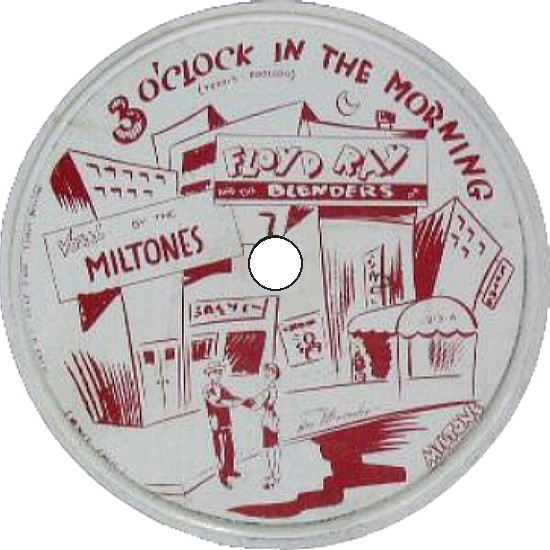
|
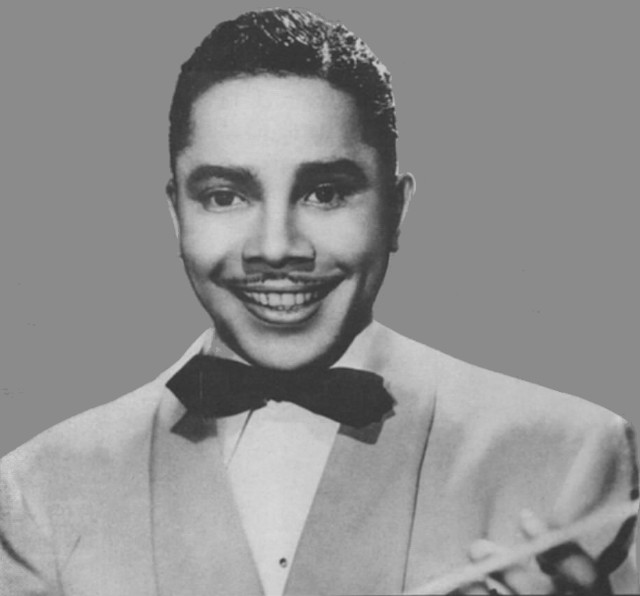
|
Above Left: Label image of Miltone 213, released in 1947. There is no vocal group on the other side of this record. The Miltones are the same vocal group as The Ebonaires. Floyd Ray and His Orchestra had previously released the same song, "Three O'Clock In The Morning", on Decca Records in 1939. Interestingly, the flip-side of the Decca record, "Commin' On With The Blues", is the same song as the flip of the Miltone record.
Above Right: Photo of Floyd Ray, who was a "swing-time" orchestra conductor based in the Los Angeles area. Floyd Ray's band achieved great notoriety in the 1930s and early 1940s. His career was temporarily halted when he was inducted into the Army in 1942. He reformed his orchestra in 1945, including some of the key musicians that had been with him earlier.
"Three O'Clock in the Morning" was composed by Julian Robledo, who published the music as a piano solo in 1919. Two years later Dorothy Terriss wrote the lyrics. Paul Whiteman's instrumental recording in 1922 became one of the first twenty recordings in history to sell over one million copies.
Modern Music Records released a version of "Three O'Clock In The Morning" by Gene Phillips And His Rhythm Aces in 1947. The label shown at right is a reissue on the Modern Records label. Audio of this side is included below.
LISTEN (Windows Media Player): [Audio restoration by Dave Saviet.]
1. "3 O'Clock In The Morning" - The Miltones (Floyd Ray And The Blenders) - Miltone 213 - 1947.
2. "Three O'Clock In The Morning" - Floyd Ray And His Orchestra (Vocal By Ensemble) - Decca 2337 A - 1939.
3. "Three O'Clock In The Morning" - Gene Phillips And His Rhythm Aces (Vocal By Ensemble) - Modern Music 20-519A - 1947.ALL THREE SONGS played in sequence.
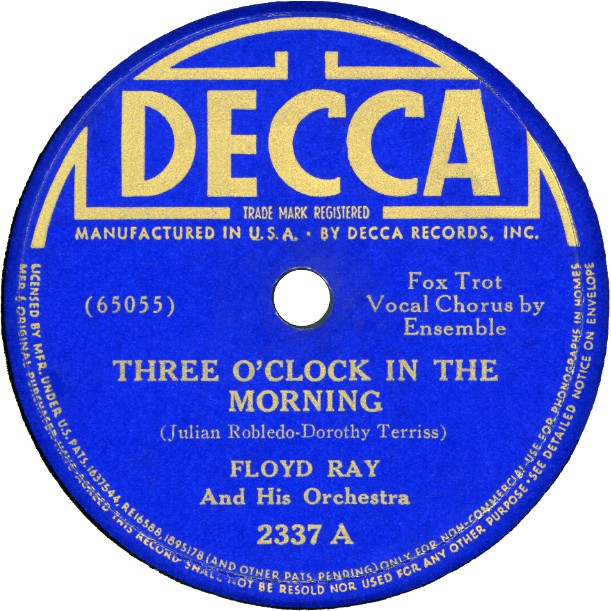
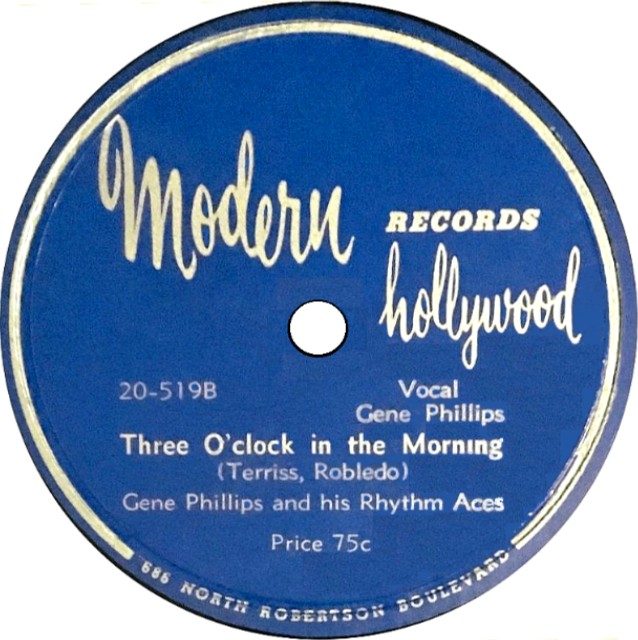
JIMMY WITHERSPOON: Jimmy Witherspoon was a blues singer, bandleader, and composer. He had at least twenty-two records released on the Modern label in the period 1948 to 1953. He first recorded for Philo Records (the precurser of Aladdin Records) in 1945, then moved to the Mercury label and next to Supreme Records, where he had his big hit, "Ain't Nobody's Business", in 1949.
Then came Modern Records followed by the Federal and Checker labels in the mid-1950s. On Federal, two of his records were backed vocally by The Lamplighters and released in 1953 and 1954.
THE GAZETTE (Montreal, Canada), September 22, 1997: JIMMY WITHERSPOON BRIDGED BLUES, JAZZ WORLDS
NEW YORK—(Obituary) Jimmy Witherspoon was born in 1923 in Gurdon, Arkansas, where he grew up singing in the choir of the First Baptist Church. He ran away from home in the mid-1930s to work in Los Angeles, and from 1941 to 1943 was in the merchant marine.His first break came during that time, sitting in with Teddy Weatherford's jazz band on the Armed Forces Radio broadcast from Calcutta, India.
Returning in 1944 to San Francisco, where his mother lived, he replaced Walter Brown in Jay McShann's band.... He toured and recorded with McShann for four years.... But he was not widely known until his first hit record under his own name, a version of "Ain't Nobody's Business", made in 1949, with McShann playing piano. It became a No. 1 hit on the rhythm and blues charts for 34 weeks....
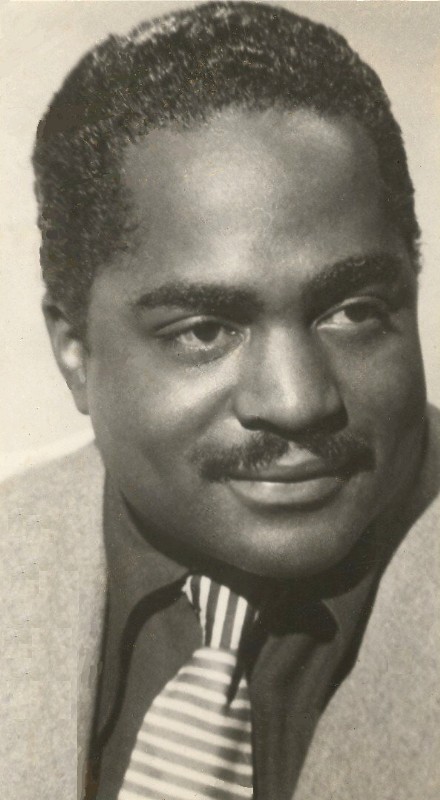
|
Above: Photo of Jimmy Witherspoon. [Photo is courtesy of Paul Ressler. Restoration is by Tony Fournier.]
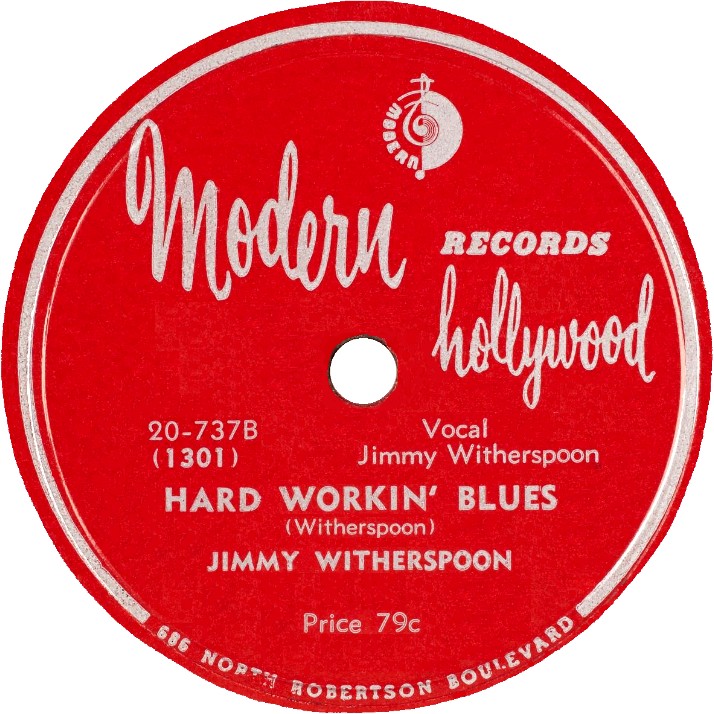
|
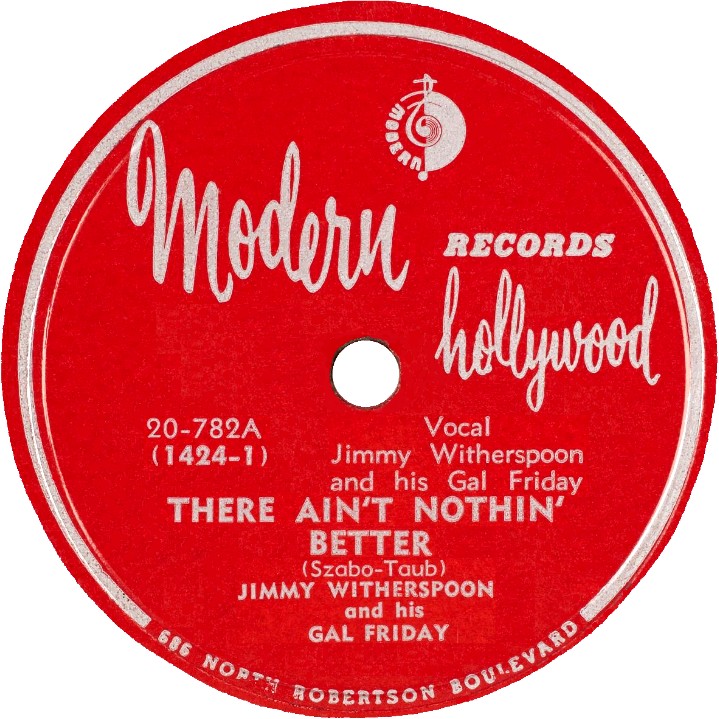
|
Above Left: Label image of Modern Records 20-737B, released in 1950. Above Right: Label image of Modern Records 20-782A, released in 1950. "His Gal Friday" is Mickey Champion.
LISTEN (Windows Media Player): [Audio restoration by Dave Saviet.]
1. "Hard Workin' Blues" - Jimmy Witherspoon - Modern 20-737B - 1950.
2. "There Ain't Nothing Better" - Jimmy Witherspoon And His Gal Friday - Modern 20-782A - 1950.BOTH SONGS played in sequence.
Cash Box Review (12-9-50):
JIMMY WITHERSPOON — MODERN 20-782 - There Ain't Nothing Better
A steady slow beat features this torrid side by Jimmy Witherspoon. The top deck sees Jimmy and His Gal Friday going to town on some amusing lyrics. It is tailor made for his fans.Cash Box Review (2-25-50):
JIMMY WITHERSPOON — MODERN 20-737 - Hard Workin' Blues
The wide popularity of Jimmy Witherspoon, whose rendition of "No Rolliní Blues" is a current hot item, should account for some heavy coin play on this record. Wax tabbed "Hard Workiní Blues" is gravy for music ops.Jimmyís vocal work shines brightly, with some excellent ork backing rounding out the side. It's a platter that will garner repeat coin play, and rates a spot in music ops machines. Latch on!
Cash Box Review (3-11-50): [Reviewed again by Cash Box two weeks later.]
JIMMY WITHERSPOON — MODERN 737 - Hard Workin' Blues
A side by Jimmy Witherspoon, and some hot and holler blues in the offing for music ops, via this one titled "Hard Workiní Blues". The end features Jimmy in the vocal spotlight, turning out some great blues. Itís mellow, low-down stuff, the kind that consistently grabs an avalanche of juke box coin play.Music ops familiar with Jimmyís wide popularity will lose no time in getting next to this.
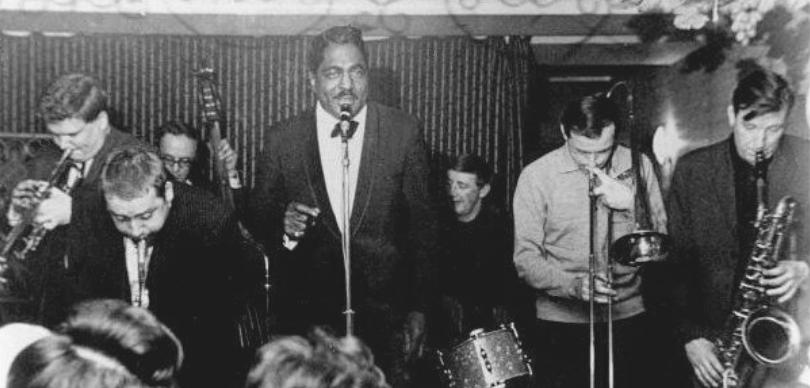
(JIMMY WITHERSPOON AND BAND PERFORMING)
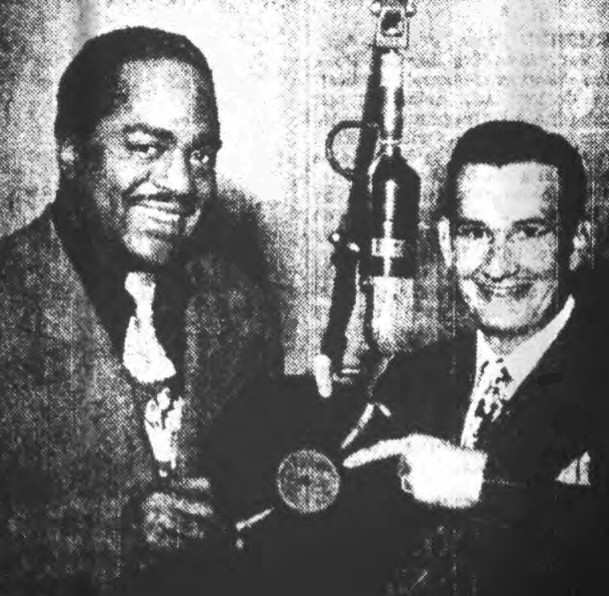
|
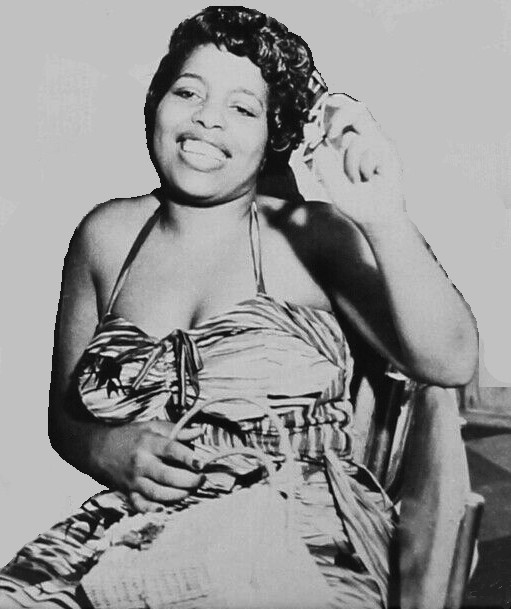
|
Above Left: PITTSBURGH COURIER, May 14, 1949:
CONGRATS—Blues shouter Jimmy Witherspoon receives congratulations from Hunter Hancock, popular Hollywood disc jockey, for his hit, "Ain't Nobody's Business". The waxing is one of the most popular tunes in the nation today. According to Supreme Records, sales have already topped the 200,000 mark.
(NOTE: The mentioned song is included further down this page under Jimmy Witherspoon's "EXTRA RECORD".)Above Right: Photo of Mickey Champion, also known as "His Gal Friday". Mickey had two sides, with The Nic Nacs (aka The Robins) backing her vocally, on Modern Records' subsidiary label, RPM, recorded in November 1950 and released the following month. Again, her name was not credited on the labels. Was she under contract with another record company at the time?
THE BILLBOARD, August 4, 1951:
....Jimmy Witherspoon may be Hunter Hancock's first guest at Hancock's weekly vaude shows at the Lincoln Theater....
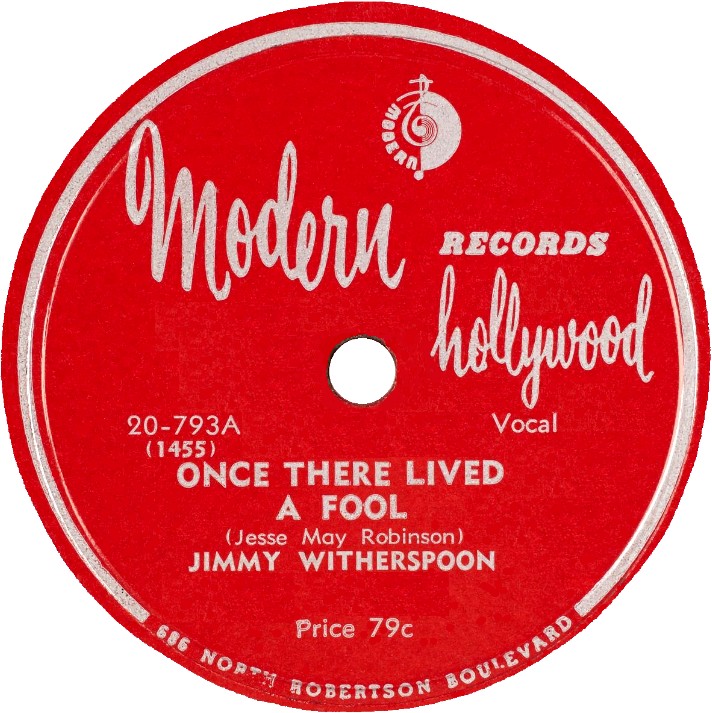
|
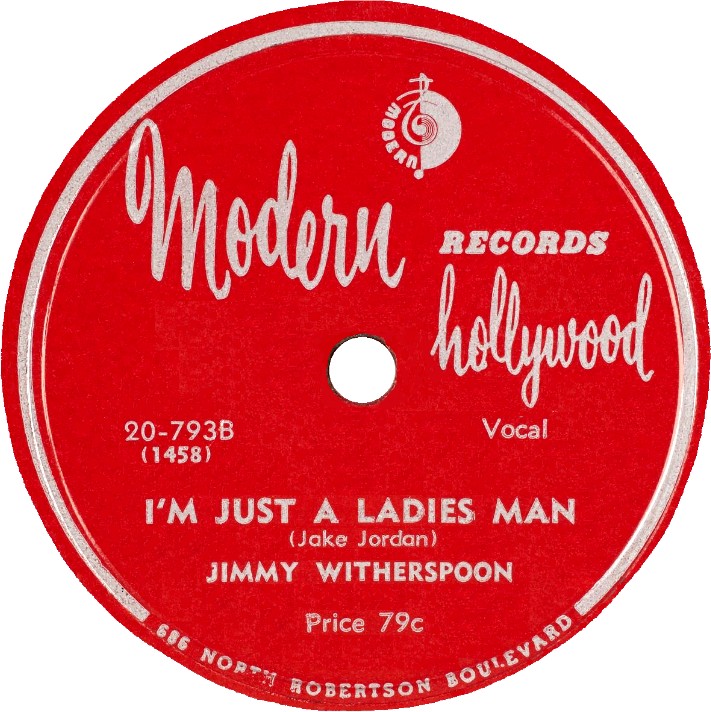
|
Above: Label images for both sides of Modern Records 20-793A/B, released in 1950. Jesse Mae Robinson composed several hit songs other than "Once There Lived A Fool", including "I Went To Your Wedding", "Keep It A Secret", and "Blue Light Boogie". LISTEN (Windows Media Player): [Audio restoration by Dave Saviet.]
1. "Once There Lived A Fool" - Jimmy Witherspoon - Modern 20-793A - 1950.
2. "I'm Just A Ladies Man" - Jimmy Witherspoon - Modern 20-793B - 1950.BOTH SONGS played in sequence.
Cash Box Review (1-6-51):
JIMMY WITHERSPOON — MODERN 20-793 - Once There Lived A Fool/I'm Just A Ladies Man
A wonderful song is given a good going over by Jimmy Witherspoon on the upper deck. Singing out the lyrics very slowly, he adds a good melodic turn to them and has some grand backing.The lower half is a shouting blues number which Jimmy does so well and it features some terrific instrumentals. This is fine for ops.
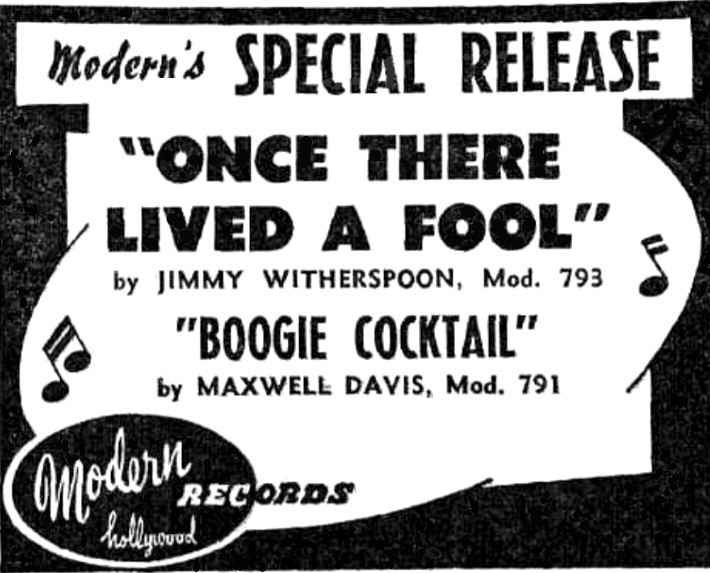
|
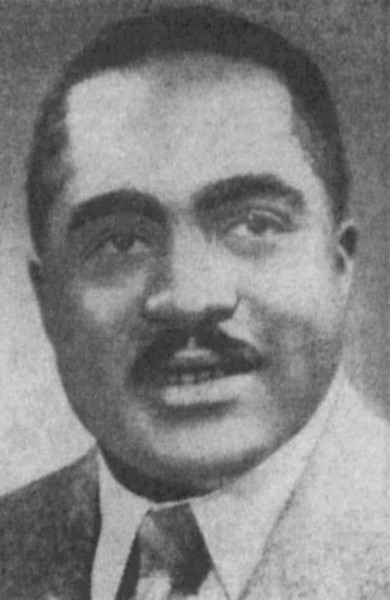
|
Above Left: THE BILLBOARD, January 20, 1951. Above Right: DAILY NEWS (New York City), November 16, 1951:
BLUES SINGER Jimmy Witherspoon heads cast of jazz personalities in all-star "Rhythm and Blues" show Saturday, Olympic.
EXTRA RECORD — JIMMY WITHERSPOON:
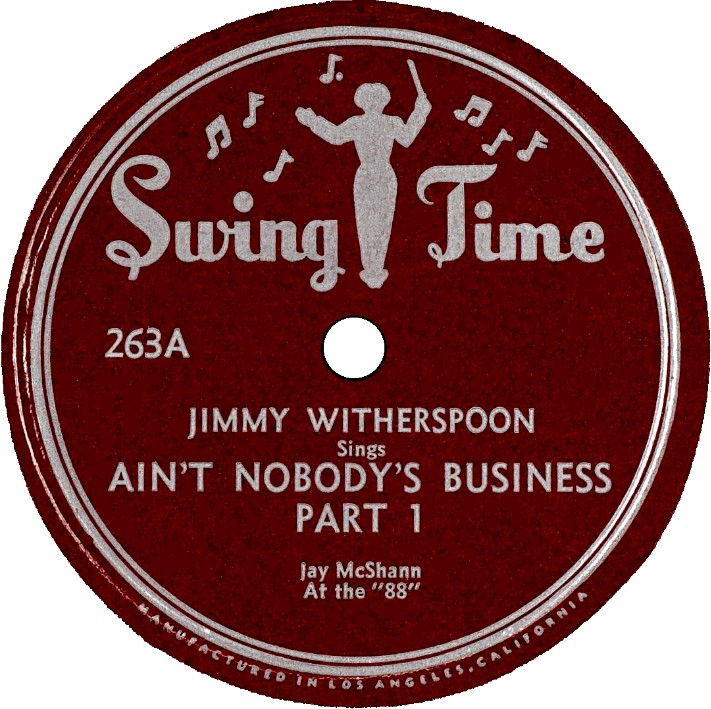
|
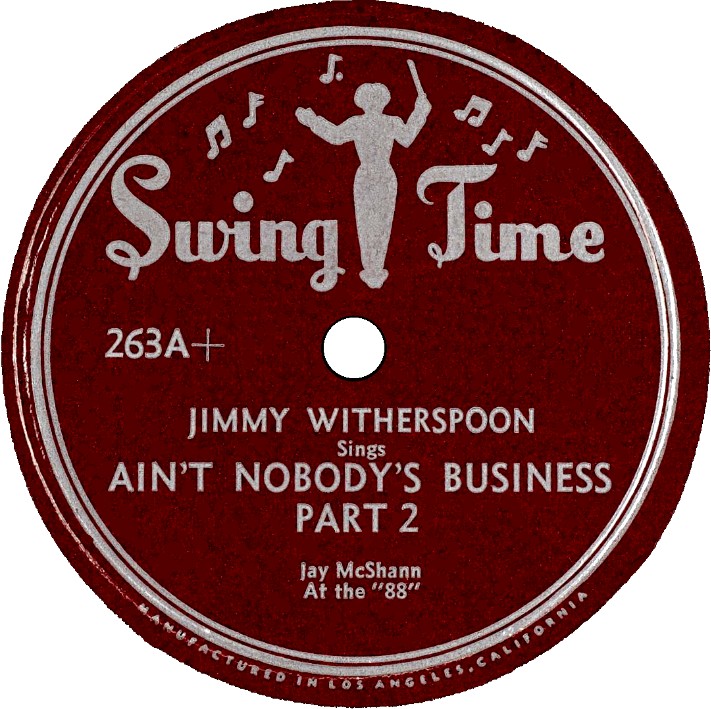
|
Above: Label images for both sides of Swing Time 263A/A+, released in April 1951. This record was a big hit for Jimmy Witherspoon in 1949 on Supreme Records. Swing Time procured masters from the defunct Supreme label and re-issued many of them, including some Witherspoon recordings, on their own label. In March 1951, Modern Records had Witherspoon re-record "Ain't Nobody's Business" and released it on Modern 808. The Billboard reviewer gave it a "good' rating and wrote "Doubtful that he could repeat his top record hit so soon saleswise".
In June 1951, Modern Records tried to revive the song again as "Love And Friendship", released on Modern 827. The Billboard reviewer stated "This is 'Ain't Nobody's Business' with a new and effective lyric. Witherspoon delivers with feeling, and combo, highlighted by the fine tenor [sax] and piano, does fine." They gave the side an "excellent" rating.
LISTEN (Windows Media Player): [Audio restoration by Dave Saviet.]
1. "Ain't Nobody's Business Part 1" - Jimmy Witherspoon - Swing Time 263A - 1951.
2. "Ain't Nobody's Business Part 2" - Jimmy Witherspoon - Swing Time 263A+ - 1951.BOTH SONGS played in sequence.
The Billboard Review (2-12-49):
JIMMY WITHERSPOON — SUPREME 1506
Ain't Nobody's Business Parts 1 and 2 (77) An old, hauntingly attractive blues ditty warbled in relaxed, old-time style. Jay McShann's piano provides the mood atmosphere.
(NOTE: Ratings had a range of 0-100 with 70-79 considered as "good".)
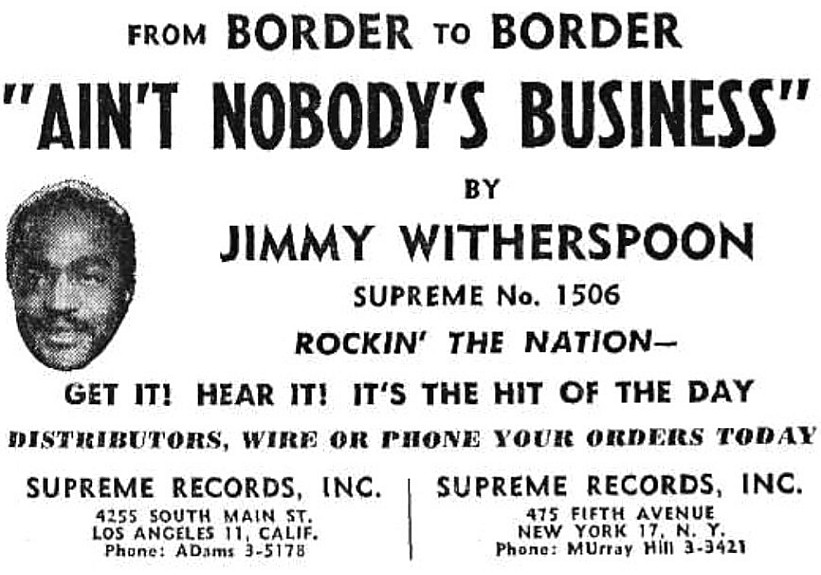
|
Above: THE BILLBOARD, June 1949.
EXTRA RECORD — NOBODY'S BUSINESS IF I DO:
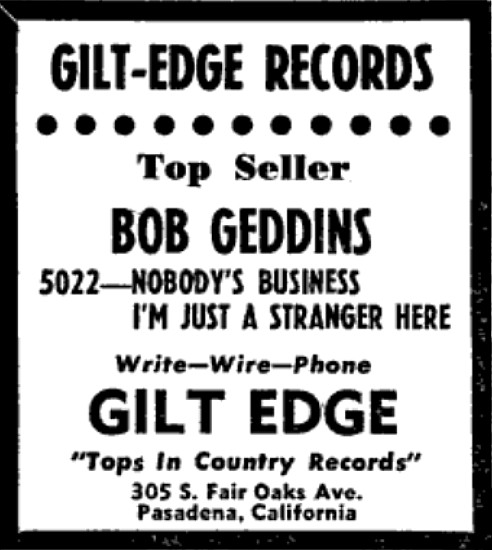
|
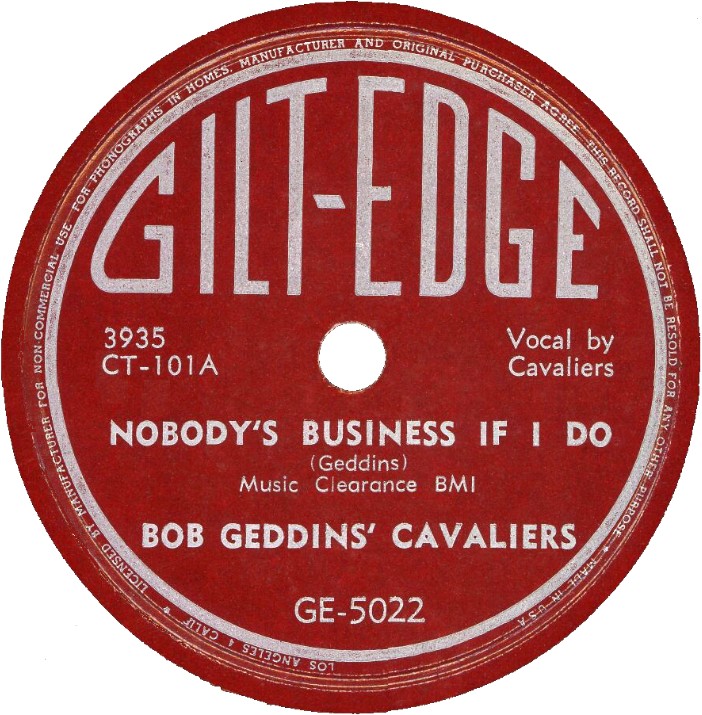
|
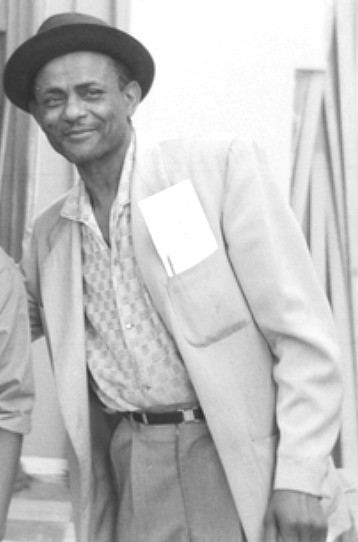
|
Above Left: THE BILLBOARD, February 10, 1951. Above Middle: Label image of Gilt-Edge GE-5022, released in 1950. On this record, there is a bizarre, confrontational bass recitation about what might happen to the wife and mother-in-law. Bob Geddins seems to be responsible for these lyrics of this old classic, as he takes credit on the label as composer.
Above Right: Photo of Bob Geddins.
The Gilt-Edge Disc Jockey labels give Bob Geddins' biographical information as follows: "A very talented songwriter and recording artist now residing in the Oakland, California area. He has long been a successful producer of recordings in the rhythm and blues field. Originally from Texas, Bob Geddins is a very talented colored boy who has made his way up the ladder in the music business. A successful composer and talent scout, he now is going places as a recording artist as well".LISTEN (Windows Media Player): [Audio restoration by Dave Saviet.]
"Nobodyís Business If I Do" - Bob Geddins' Cavaliers - Gilt-Edge GE-5022 - 1950.Bob Geddins' Cavaliers had four releases on Bob Geddins' own Cava-Tone label (1949), one on Modern Records (1949), and two on Gilt-Edge (1950-51). The Gilt-Edge and Modern are reissues of the Cava-Tone sides.
The Cava-Tone label shows the Cavaliers to be "L. Thomas - Guitar, J. Wilson - Lead, B. Bostic - Bass, S. Louis - Piano, and V. Eldridge - Tenor". Their full names are LaFayette Thomas, Jimmy Wilson, Bill Bostic, Sherman Louis, and V(?) Eldridge. They also performed as "The Jubilee Gospel Singers", somewhat incompatible with the lyrics to "Nobody's Business".
Opal Louis Nations, in his Real Blues (Number 8) article, has The Cavaliers as LaFayette Thomas, guitar; Jimmy Wilson, lead vocals; B. Bostic, bass; G. Salter, baritone; Sherman Louis, piano; and V. Eldridge, tenor.
HELEN HUMES: THE COURIER-JOURNAL (Louisville, KY), September 14, 1981:
JAZZ SINGER HELEN HUMES, NATIVE OF LOUISVILLE
SANTA MONICA, CA—(Obituary) Helen Humes was born in Louisville on June 23, 1913, the daughter of J.H. Humes, one of the city's first black attorneys.She grew up on Iowa Street, a few blocks from Churchill Downs, and heard her first blues at the Lincoln Theatre....She learned to play piano.... She made her first record at the age of 15 in St. Louis.... She wrote blues tunes, and in 1938 she recorded with the Harry James Orchestra.
After a brief time back in Louisville, she was off again to Cincinatti's Cotton Club. Count Basie heard her there in 1937 and liked her. The next year, Helen Humes took Billie Holiday's place in Basie's band, leaving him in 1942....
At Right: Helen Humes and Count Basie And His Orchestra at The Apollo (1939).
HELEN'S RECORDING INFORMATION:
Helen Humes was a singer, pianist, and composer. Her first records after leaving Count Basie were on the Decca label with Pete Brown And His Band and the Savoy label with Leonard Feather's Hiptet.Then Helen moved to the Philo label (later to become Aladdin). Philo is where she had her big hit, "Be-Baba-Leba", in 1945. This was followed by Black & White Records and her "Be Ba Ba Le Ba Boogie" in 1946.
Next was Mercury (one of these records is included further down in this section). Then came the Discovery label and the 1950 "E-Baba-Le-Ba", recorded before a live audience at Frank Bull and Gene Norman's "Blues Jubilee".
She reached Modern Records in 1950 producing four records for them within two years. This included two versions of "Million Dollar Secret"/"I'm Gonna Let Him Ride", one of those recorded at the above mentioned "Blues Jubilee". Perhaps it was a master purchased from Discovery.
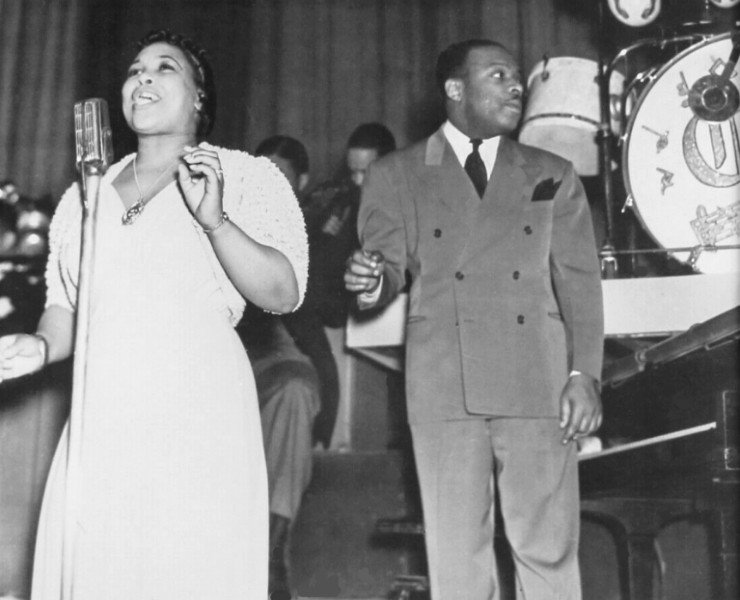
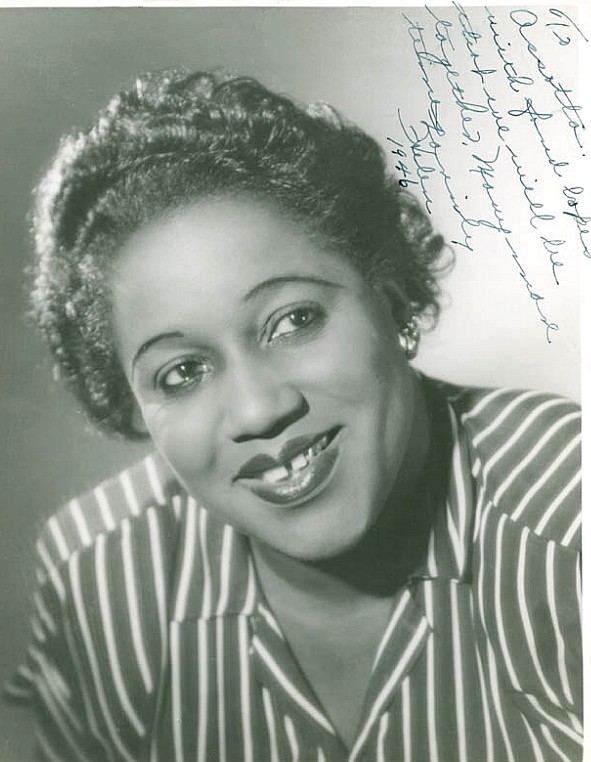
|
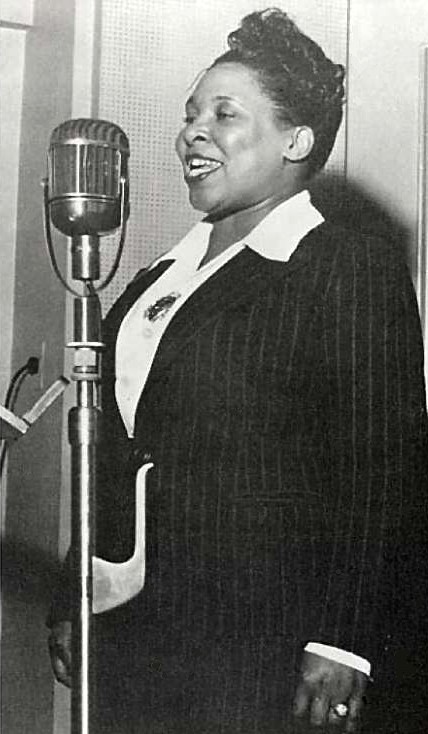
|
Above: Two photos of Helen Humes.
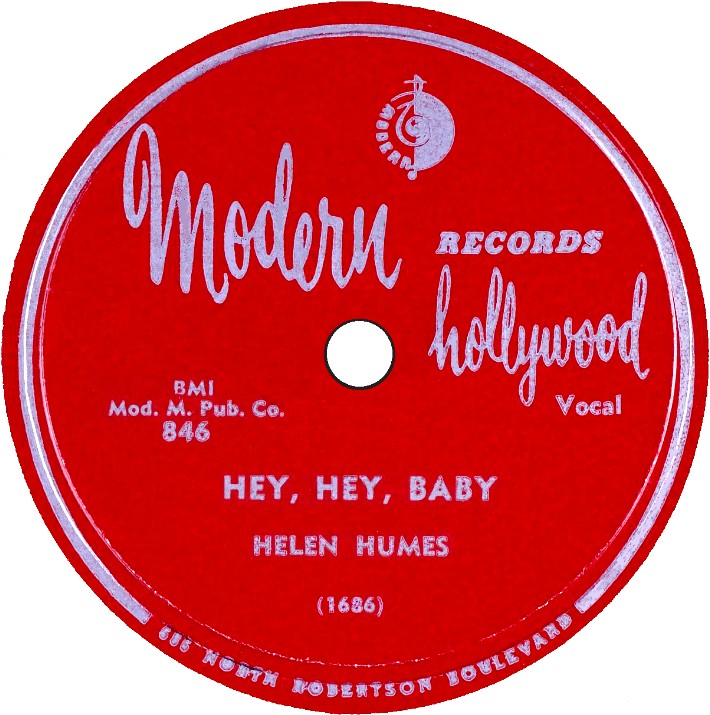
|
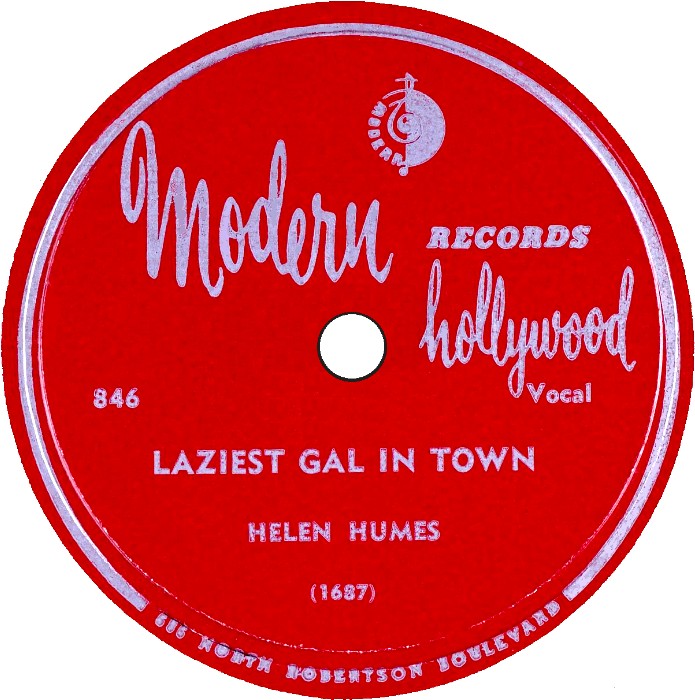
|
Above: Label image for both sides of Modern Records 846, released in 1951. As seen, Modern Records was not in the mood to bestow any composer credits on these labels. "Laziest Gal In Town" is a Cole Porter composition. A vocal group backs Helen's singing on the "Hey, Hey, Baby" side. Modern Records has dropped using the "20-" prefix to their numbering system.
LISTEN (Windows Media Player): [Audio restoration by Dave Saviet.]
1. "Hey, Hey, Baby" - Helen Humes (With Vocal Group) - Modern 846 - 1951.
2. "Laziest Gal In Town" - Helen Humes - Modern 846 - 1951.BOTH SONGS played in sequence.
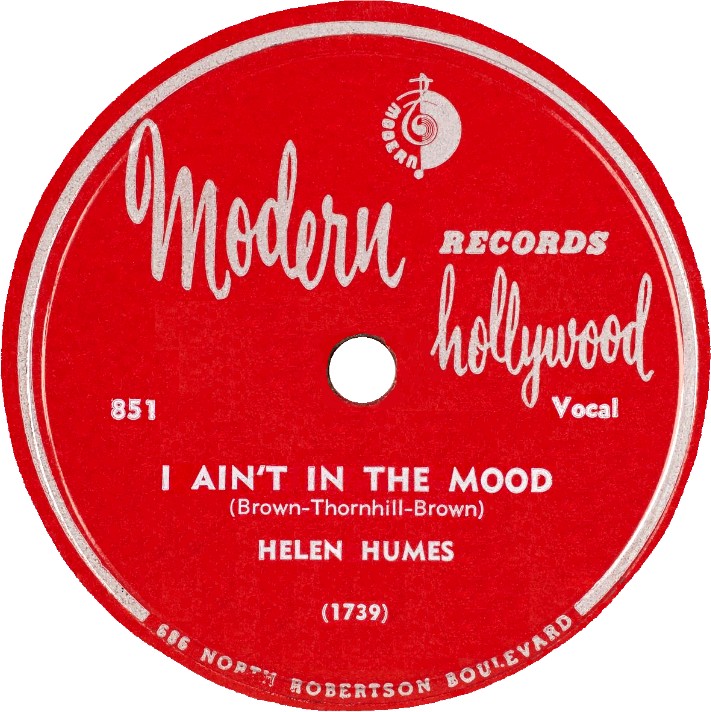
|
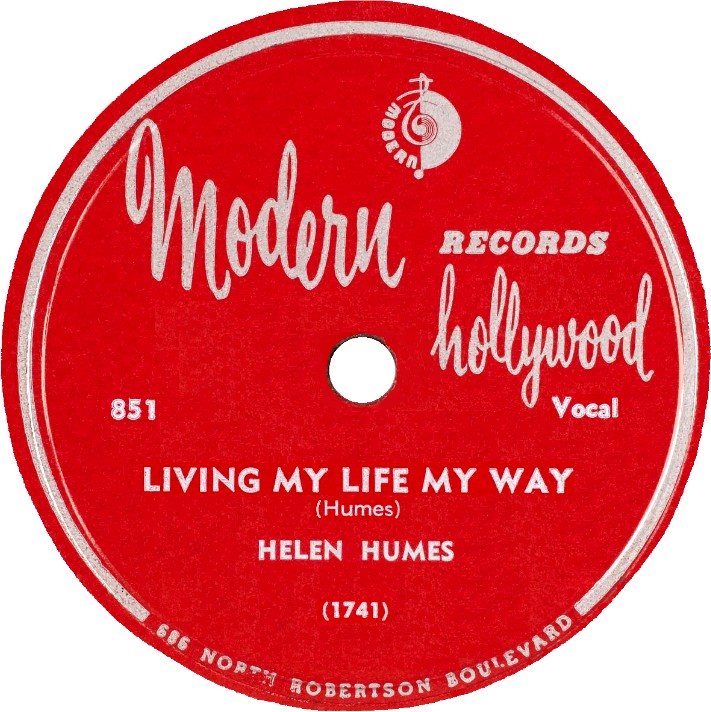
|
Above: Label images for both sides of Modern Records 851, released in 1951. LISTEN (Windows Media Player): [Audio restoration by Dave Saviet.]
1. "I Ain't In The Mood" - Helen Humes - Modern 851 - 1951.
2. "Living My Life My Way" - Helen Humes - Modern 851 - 1951.BOTH SONGS played in sequence.
At Right: The Count and his two featured vocalists, (L-R) Jimmy Rushing, Count Basie, and Helen Humes.
Cash Box Review (12-22-51):
HELEN HUMES — MODERN 851 - I Ain't In The Mood/Living My Life My Way
Two contrasting halves are waxed by Helen Humes on this disk. The upper one is a driving but slow blues number thatís complete with echo chamber and other vocal effects. Flip is a lovely ballad done beautifully by Helen and this side carries enough appeal to make it a strong contender.The Billboard Review (12-29-51):
HELEN HUMES — MODERN 851
I Ain't In The Mood (76) Singing thru an echo chamber, the ex-band chirp gets off a fine blues reading. Fine coverage.
Living My Life My Way (70) Miss Humes still impresses as a first-rate singer. She handles a self-written blues ballad with skill tho it may all be a little too relaxed.
(NOTE: Ratings had a range of 0-100 with 70-79 considered as "good".)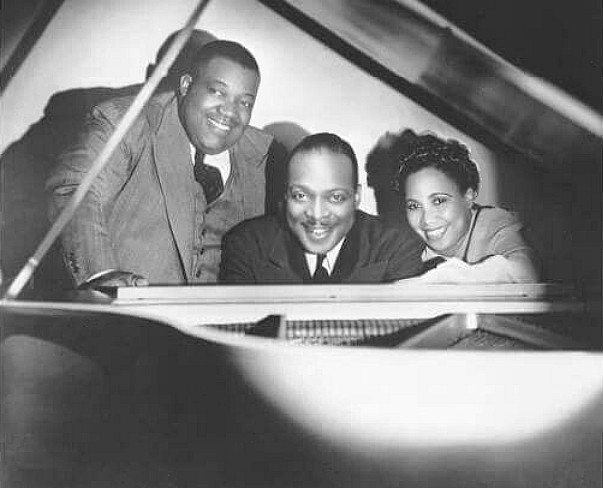
EXTRA RECORDS — HELEN HUMES:

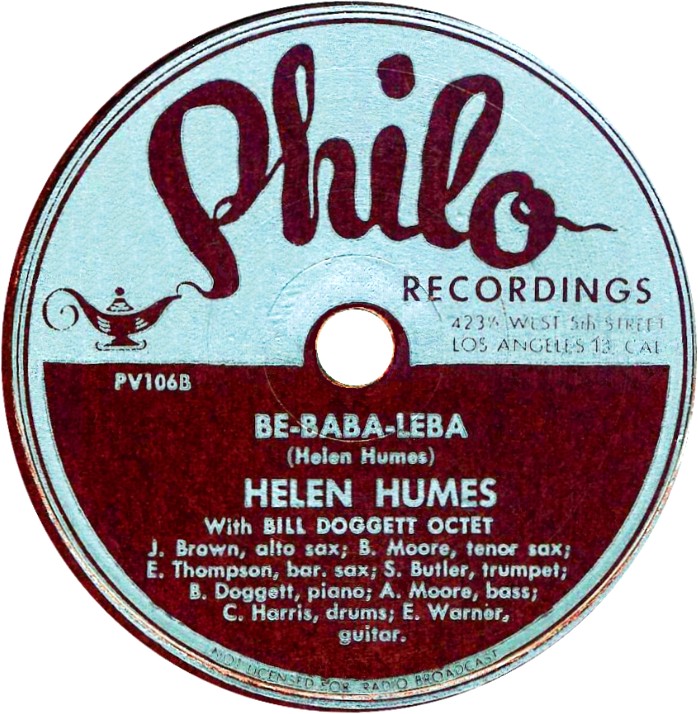
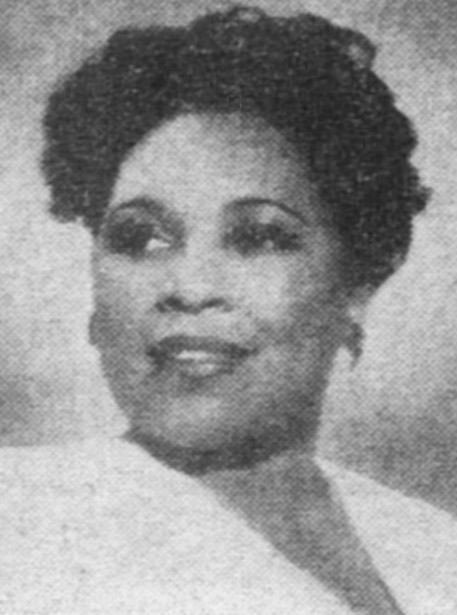
Above Left: Label image for Philo PV106B, released in 1945. "Philo", which was named after Eddie and Leo Messner's record store, "Philharmonic Record Shop", changed it's name to "Aladdin" in 1946. Above Right: DETROIT FREE PRESS, May 12, 1946.
At Left: THE BILLBOARD, December 22, 1945.
LISTEN (Windows Media Player): [Audio restoration by Dave Saviet.]
"Be-Baba-Leba" - Helen Humes With Bill Doggett Octet - Philo PV106B - 1945.
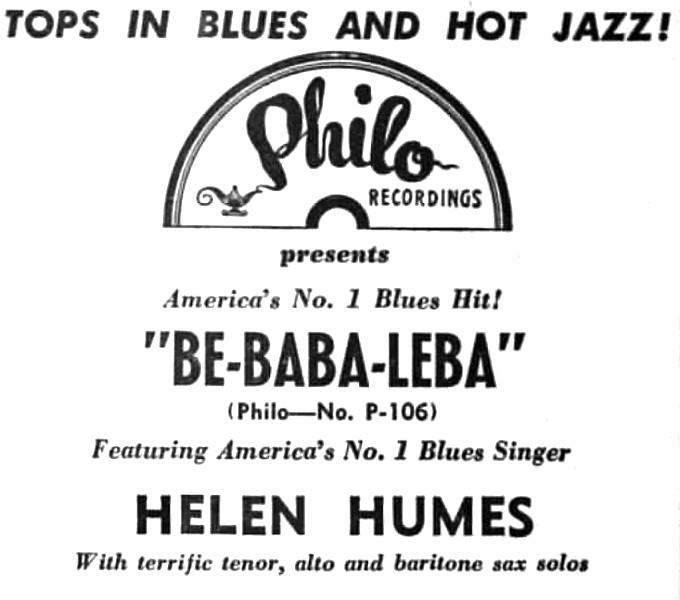
Above Right: THE BILLBOARD, October 20, 1945.
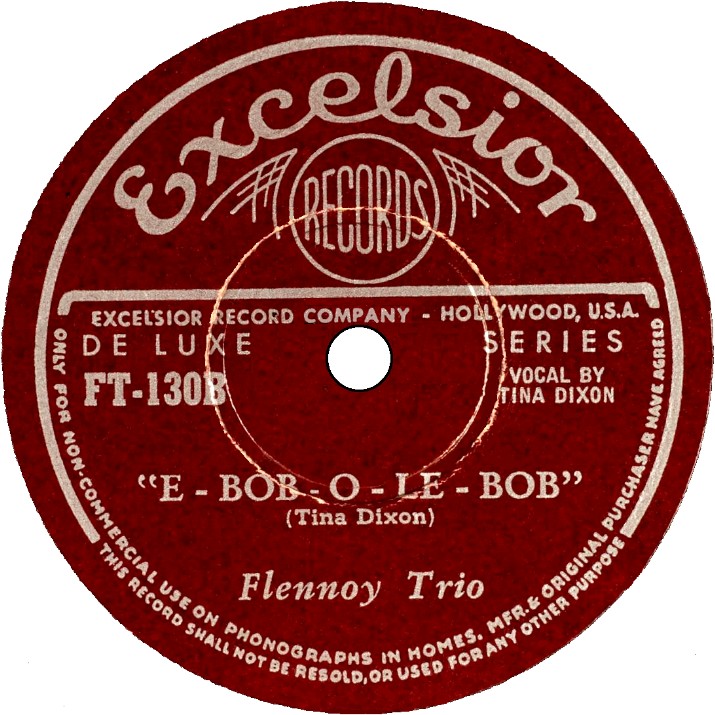
|
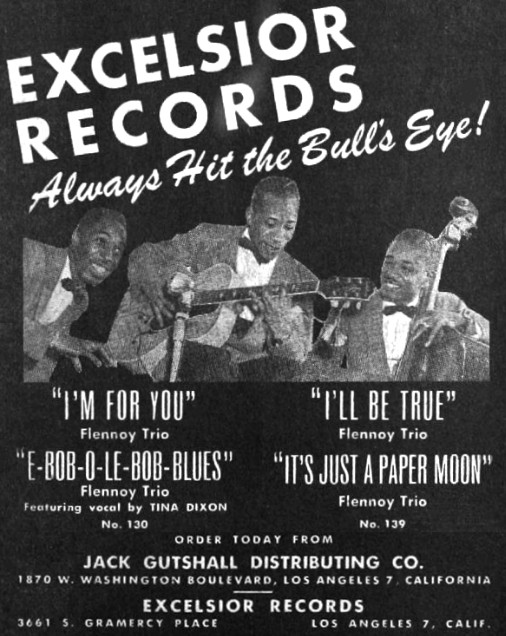
|
Above Left: Label image for Excelsior FT-130B, released in 1945. Tina Dixon is backed vocally and instrumentally by The Flennoy Trio. Note that the composer credit has changed from "Helen Humes" on the Philo label to "Tina Dixon" on the Excelsior label. More about that is found further down in this section. Above Right: THE BILLBOARD, September 15, 1945. (Note that the "E-Bob-O-Le-Bob" song title has a "-Blues" at the end here.)
Click HERE for an article about THE FLENNOY TRIO by Marv Goldberg. (Will open in a separate window)
LISTEN (Windows Media Player): [Audio restoration by Dave Saviet.]
"E-Bob-O-Le-Bob" - The Flennoy Trio (Vocal By Tina Dixon) - Excelsior FT-130 - 1945.The Billboard Review (11-10-45): FLENNOY TRIO — EXCELSIOR FT-130 - E-Bob-O-Le-Bob
The blend of the electric guitar and piano, with the rhythm accented by the beat of the string bass, is effectively created by the Flennoy Trio....Tina Dixon joins the threesome for the blues shouting of her own race doggerel, E-Bob-O-Le-Bob.
The Flennoys whip it up with a delightfully fast boogie beat, adding the pickings of piano and git-box.... The Flennoys have their own individual style that is definitely a winner.
The race locations alone will have the phonos eating up this side, altho the enthusiasm should extend beyond the reach of race spots alone.
(NOTE: "Doggerel" as used here means a trivially worded song.)
NOTE: The song title on the following sheet music does not match that on the record label, the advertisement, or the review.
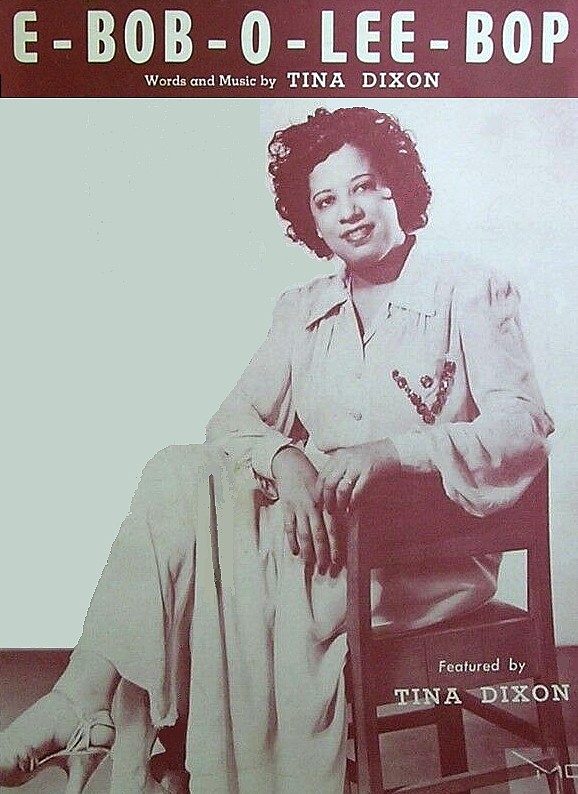
|
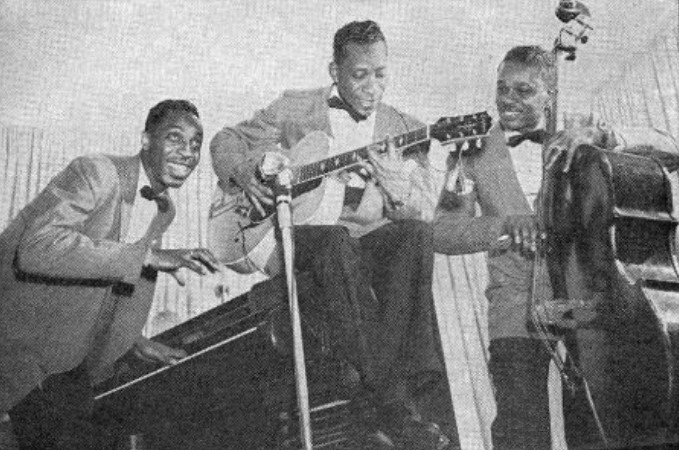
|

|
Above Left: 1945 photo of The Flennoy Trio, (L-R) Lorenzo Flennoy (piano), Jimmie Edwards (guitar), and Robert Lewis (bass fiddle). The Billboard 1945 Year Book provides us with: "The Flennoy Trio dishes out plenty of music from their piano-bass-guitar instrumentation, and augment it with trio vocals. Group's arrangements range from blues and novelties to ballads and jump, with Flennoy's steller 88-pounding highlighted. Musicianship of the trio has won them recording contracts with both Melodisc and Excelsior records....
Above Right: Photo of Tina Dixon.
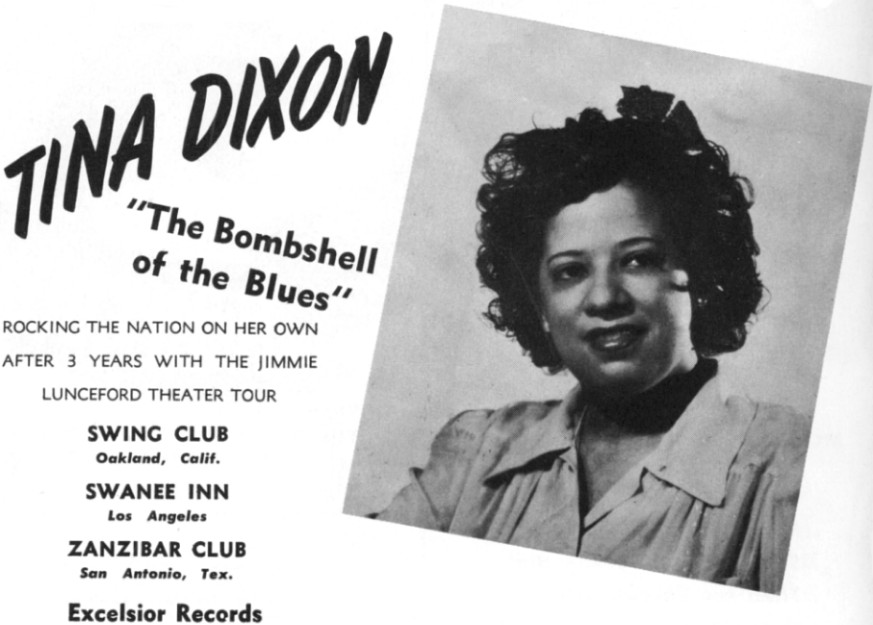
|
Above: THE BILLBOARD 1945 YEAR BOOK. The Billboard 1945 Year Book provides us with: "Detroit's Tina Dixon, the "Bombshell of the Blues", has just returned from 20 triumphant weeks on the Coast. The thrush really does a song up brown, critics stress, and she is packing them in with Limmie Lunceford, his ork and his revue. This is her third year with Lunceford's revue....
Her bio in the Billboard 1944 Year Book states she.... "started her singing career at 18. Her first club job was at the Club Ballyhoo, Detroit.... she has appeared before television cameras. Tina Dixon has made color movie shorts for Pathe...."
The Excelsior label shows "Tina Dixon" as composer, while the Philo Label shows "Helen Humes". Based on an article from The Billboard dated 1/26/46, Dixon's version was granted publishing rights because Dixon had previously been featuring it in night clubs, thereby making her's a prior copyright.
NOTE: Per the Marv Goldberg "Flennoy Trio" article, Humes' version was released first, but Dixon's was recorded first.
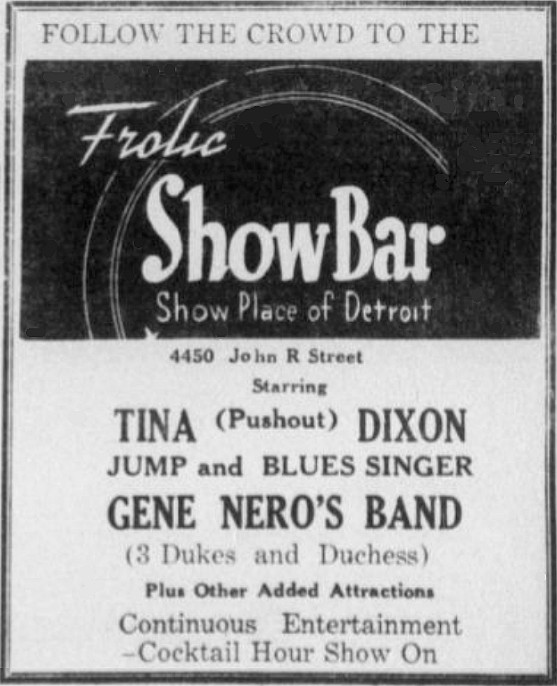
|
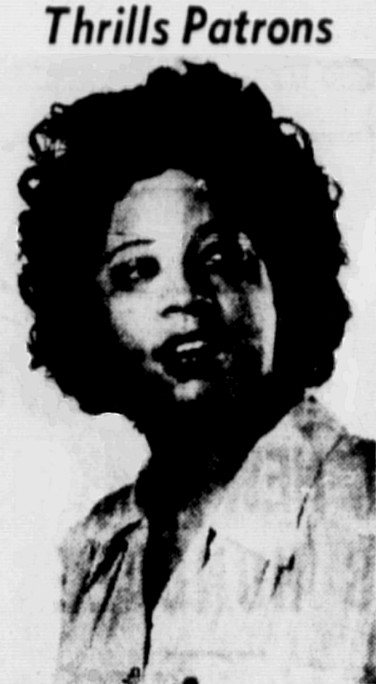
|
Above Left: DETROIT TRIBUNE, January 4, 1947.
NOTE: Tina (Pushout) Dixon. "Pushout" not quite as exciting as her previous description, "Bombshell Of The Blues".Above Right: MICHIGAN CHRONICLE, December29, 1945:
Tina Dixon and her songs are one of the reasons for the large attendance at Double V Supper Club, Conant black and tan cabaret. A different song delivery and clever arrangements of novelty and popular songs makes Tina's vocals outstanding, just what the patrons enjoy.
(NOTE: "Conant" refers to Conant Street in the Conant Gardens section of Detroit, a black neighborhood at the time.)
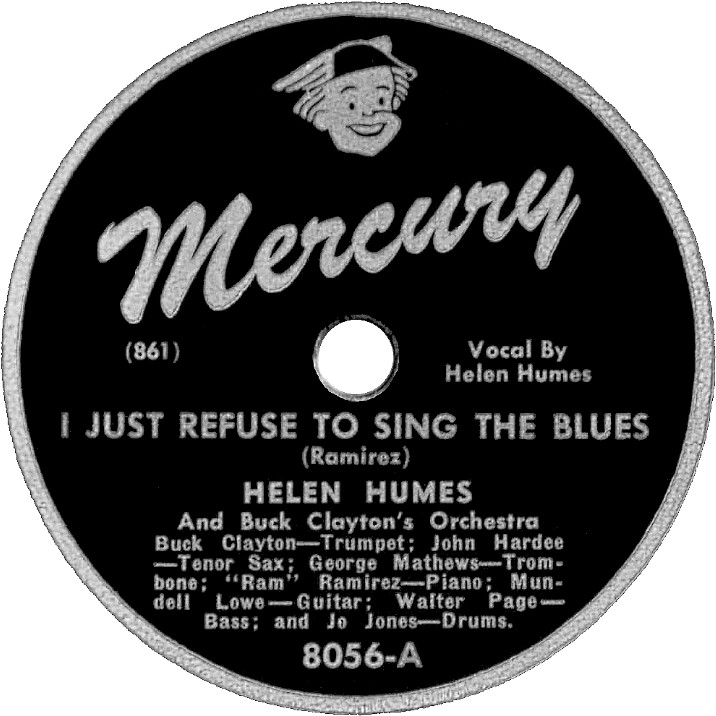
|
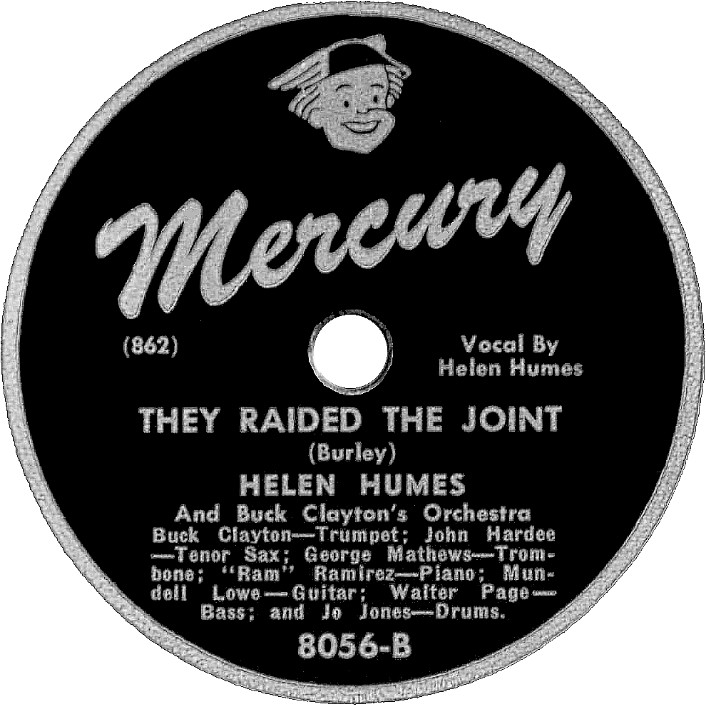
|
Above: Label image for both sides of Mercury 8056-A/B, released in 1947. LISTEN (Windows Media Player): [Audio restoration by Dave Saviet.]
1. "I Just Refuse To Sing The Blues" - Helen Humes - Mercury 8056-A - 1947.
2. "They Raided The Joint" - Helen Humes - Mercury 8056-B - 1947.BOTH SONGS played in sequence.
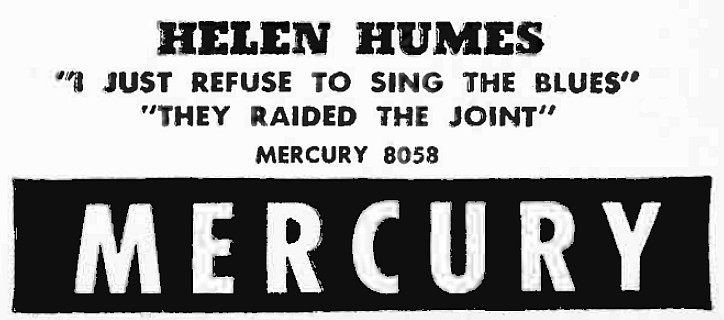
|
Above: THE BILLBOARD, September 27, 1947.
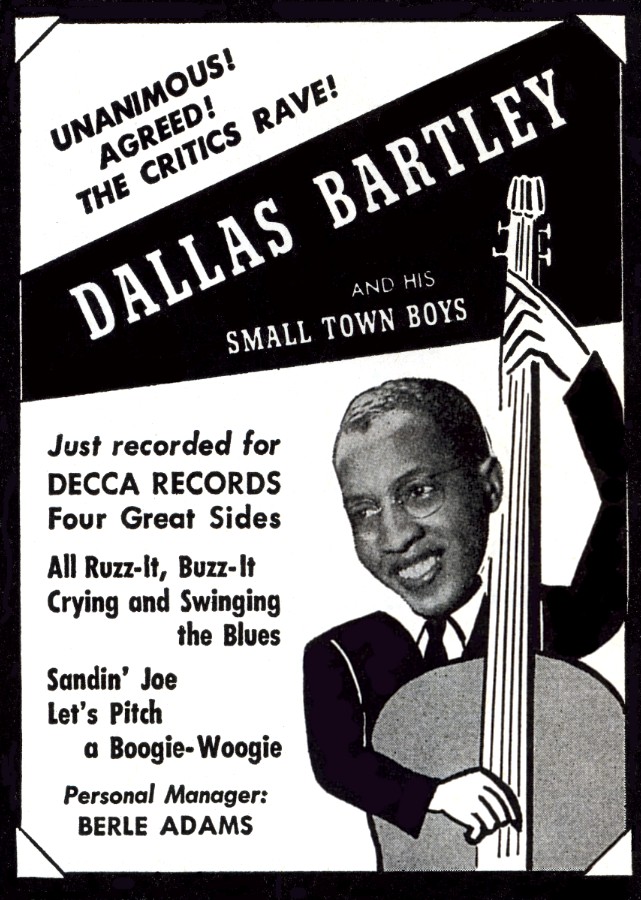
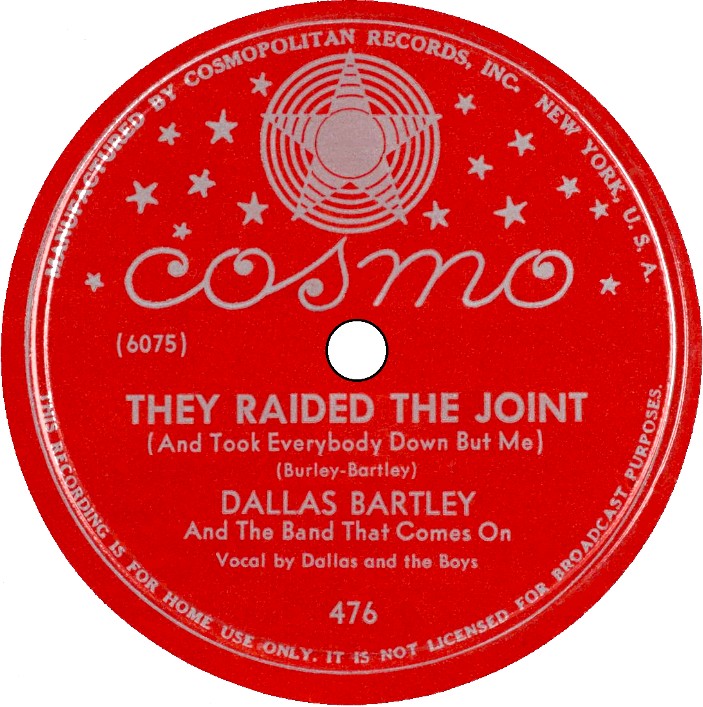
Above: Label image for Cosmo 476, released in 1946. Vocal is by Dallas and the Boys.
This side is strangely related to Helen Humes' "E-Baba-Leba". The first thirty seconds are Dallas and the Boys singing "Hey-Baba-Rebop". Perhaps because of this "difference" from Helen Humes' "Raided", Bartley decided to add his name as co-composer on the label.
Possibly the name change from "Small Town Boys" (see left) to "Band That Comes On" (above) was an attempt to draw more attention to his group as a swinging, exciting uptown band.
At Left: THE BILLBOARD 1944 YEAR BOOK.
LISTEN (Windows Media Player): [Audio restoration by Dave Saviet.]
"They Raided The Joint " - Dallas Barkley And The Band That Comes On - Cosmo 476 - 1946.
Dallas Bartley And His Small Town Boys also recorded for National (1945) and Savoy (1945), backing up Dwight "Gatemouth" Moore and Joe Turner, respectively. The Billboard 1944 Year Book's profile for Dallas Bartley provides this information: "Dallas Bartley, formerly bass man with Louis Jordan, has gone his former boss one better with a six-piece combo. Instrumentation includes drums, alto sax, tenor sax, trumpet, piano, all sparked by the bespectacled leader's powerful bass plucking. While the group's repertoire is versatile, like Jordan, its forte is jump novelties. Outfit has recently recorded four tunes for Decca, all originals of Bartley...."
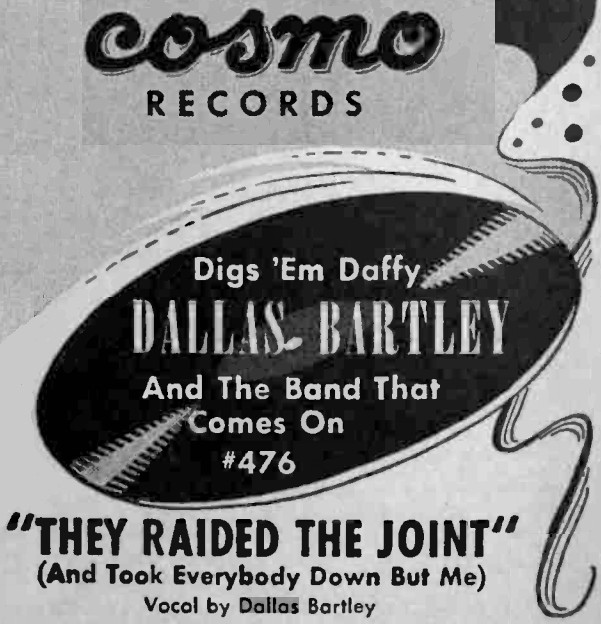
|
Above: THE BILLBOARD, April 20, 1946. THE BILLBOARD CLUB REVIEW, March 24, 1945: DALLAS BARTLEY
(Reviewed at Joe's Deluxe, Chicago)
....Dallas Bartley, former bass for Louis Jordan, learned the value of sight appeal when he was with the Tympany Five, and his own sextet combines a good share of well-arranged music and showmanship that pulls the crowd at this Negro nitery.High spot in this band's entertaining is its bit in the floorshow when the six boys in the band come out on the stage and do simple jitterbug steps while playing a Bartley original, "Let's Pitch a Boogie-Woogie".
Bartley, who is under contract to Decca, has done some excellent jump scoring for the band, with emphasis on the race blues. The rugged drive of this sextet is reminiscent of the early recordings of the Basie band. Boys do neat job on standards, and back the pop soloists in the floorshow smoothly on sweet ballads. Bill Martin, trumpeter, handles the vocals in true blue-shouting style.
MISCELLANEOUS MODERN RECORDS BLUES ARTISTS: In the early 1950s, Modern Records focused primarily on blues artists. In 1952 for example, about 75% of the records released on their Modern Hollywood banner were blues artists. The following section includes four of Modern's blues singers that had releases on the Modern label from 1950 through 1952. These are Roy Hawkins, Robert Bland (aka Bobby Blue Bland), Charley Booker, and Mary Sue.
ROY HAWKINS:
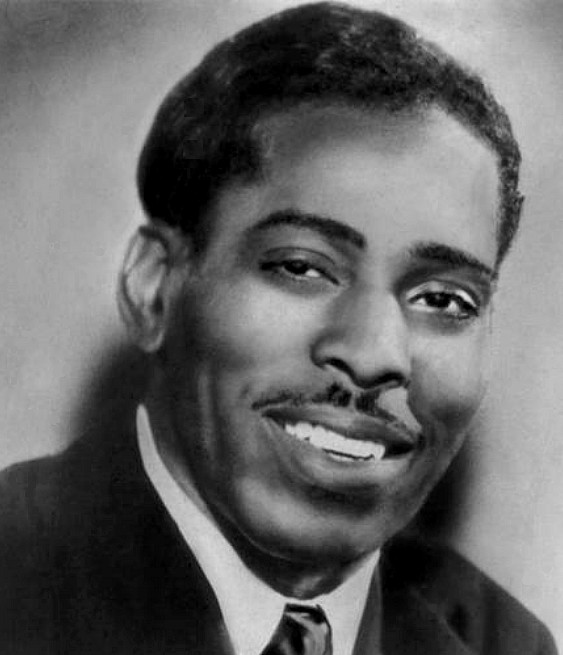
|
Above: Roy Hawkins was a blues singer, pianist, and composer. He had at least fifteen records released on the Modern label from 1949 to 1952. That included one procured from Bob Geddins' Down Town label, where Roy had recorded as "Roy Hawkins And His Four Jacks" in 1947-1948. Hawkins returned for one release on the RPM label, a subsidiary of Modern, in 1955.
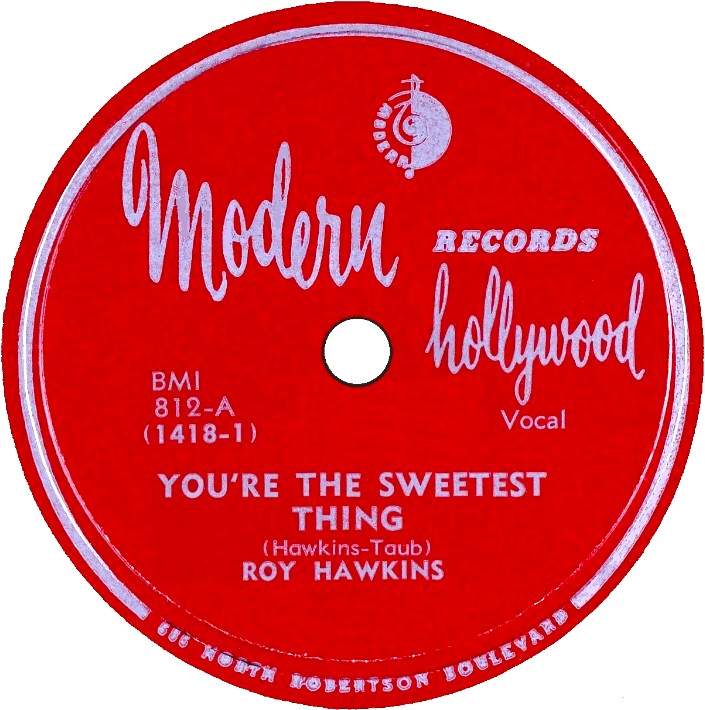
|
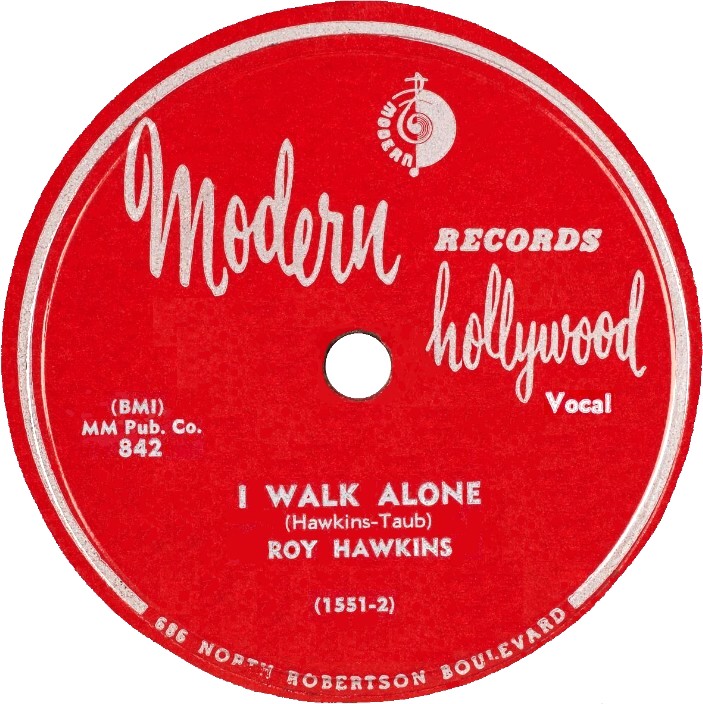
|
Above Left: Label image for Modern 812-A, released in 1950. As was common practice at Modern Records, "Taub" (aka Joe or Jules Bihari) is credited as co-composer. Above Right: Label image for Modern 842, released in 1951. Again, Mr. "Taub" grabs a portion of the song's royalties.
At Right: Label image for Modern 853, released in 1951. The flip-side is "You're A Free Little Girl".
The Billboard Review (4-14-51):
ROY HAWKINS — MODERN 812
You're The Sweetest Thing (77) Hawkins chants a moving slow blues with the horns in unison with him on the front strain for a telling effect.
(NOTE: Ratings had a range of 0-100 with 70-79 considered as "good".)Cash Box Review (11-10-51):
ROY HAWKINS — MODERN 842 - I Walk Alone
A real low down blues number is worked on by Roy Hawkins in that typical style that marks such items. Backed aptly, this deck should prove interesting listening. Ops have good filler material here.The Billboard Review (11-24-51):
ROY HAWKINS — MODERN 842
I Walk Alone (70) Hawkins chants an okay medium beat blues with okay tenor and rhythm backing.
(NOTE: Ratings had a range of 0-100 with 70-79 considered as "good".)LISTEN (Windows Media Player): [Audio restoration by Dave Saviet.]
1. "You're The Sweetest Thing" - Roy Hawkins - Modern 812-A - 1950.
2. "I Walk Alone" - Roy Hawkins - Modern 842 - 1951.
3. "I Don't Know Just What To Do" - Roy Hawkins Orhestra (Vocal By Roy Hawkins) - Modern 853 - 1951.
4. "You're A Free Little Girl" - Roy Hawkins Orhestra (Vocal By Roy Hawkins) - Modern 853 - 1951.ALL FOUR SONGS played in sequence.
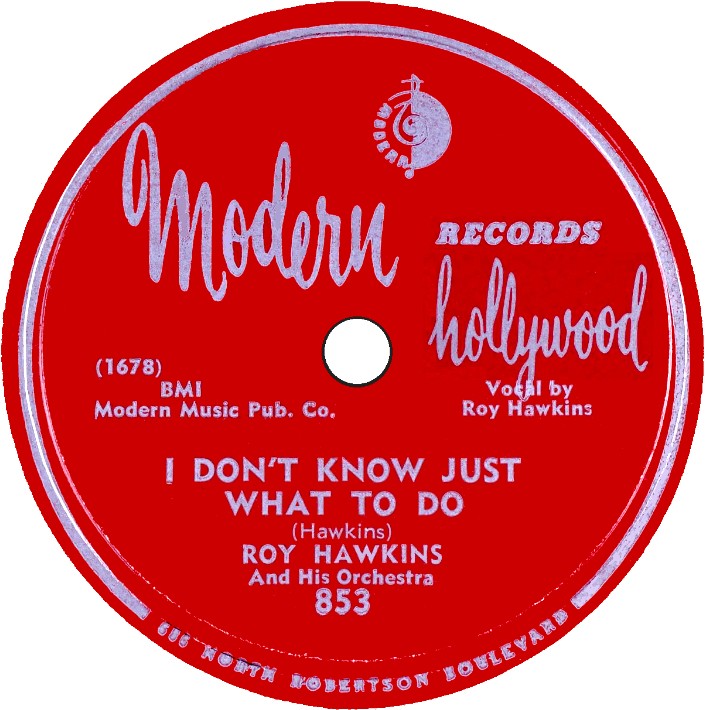
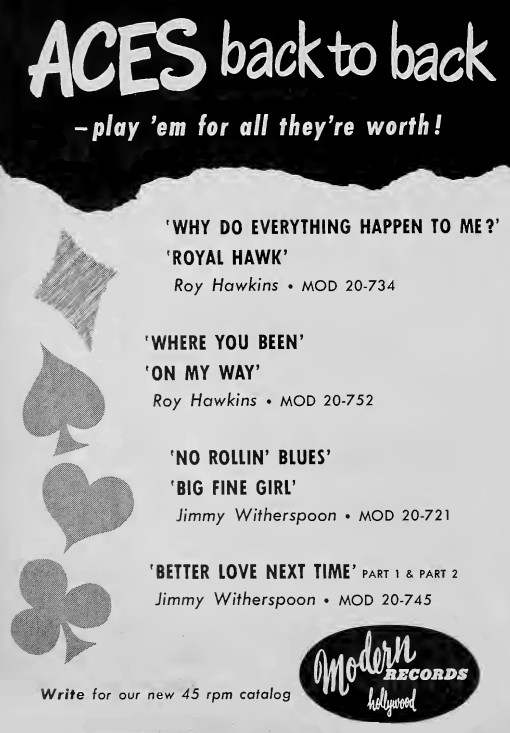
|
Above: THE BILLBOARD, April 22, 1950.
NOTE: "...our new 45 rpm catalog". Jimmy Witherspoon is featured further up on this page.
CHARLEY BOOKER:
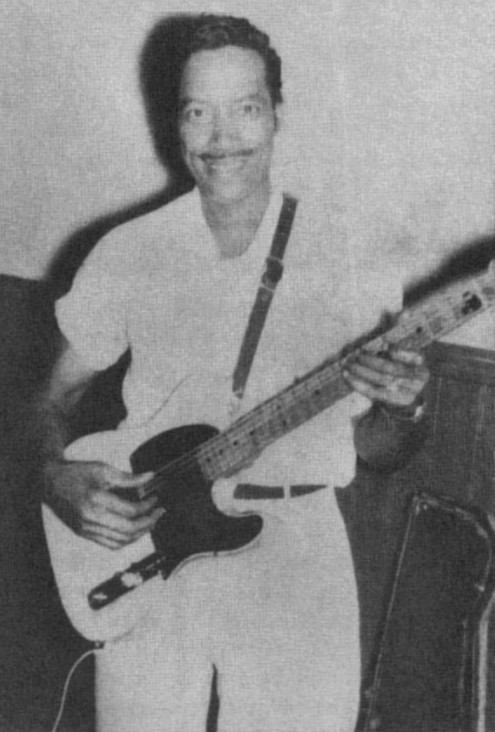
|
Above: Charley Booker, who grew up in Mississippi, was a blues singer, guitarist, and composer. He had just one release on Modern Records. After leaving Modern in 1952, he recorded some unreleased tracks for Memphis' Sun Records. SOUTH BEND TRIBUNE (Indiana), September 22, 1989: CHARLEY BOOKER
(Obituary - See accompanying picture at right)
Charley Booker was a self-taught musician who was among the first to bring the electric-guitar sound to the blues and helped later to spread the blues northward. "Charley was a heck of a showman", said Billy Nicks.... "Some of his mannerisms reminded you of Chuck Berry. They were cut from the same cloth."....Mr. Booker was among the first to experiment with guitar amplification after World War II, at a time when other musicians were skeptical about its application. His compositions include "No Riding Blues", "Charley's Boogie Woogie", and "Greenville Smoking". He recorded for several independent labels....
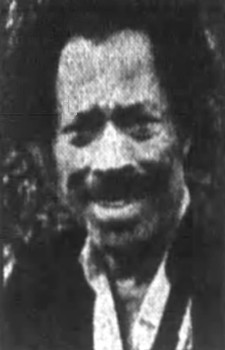
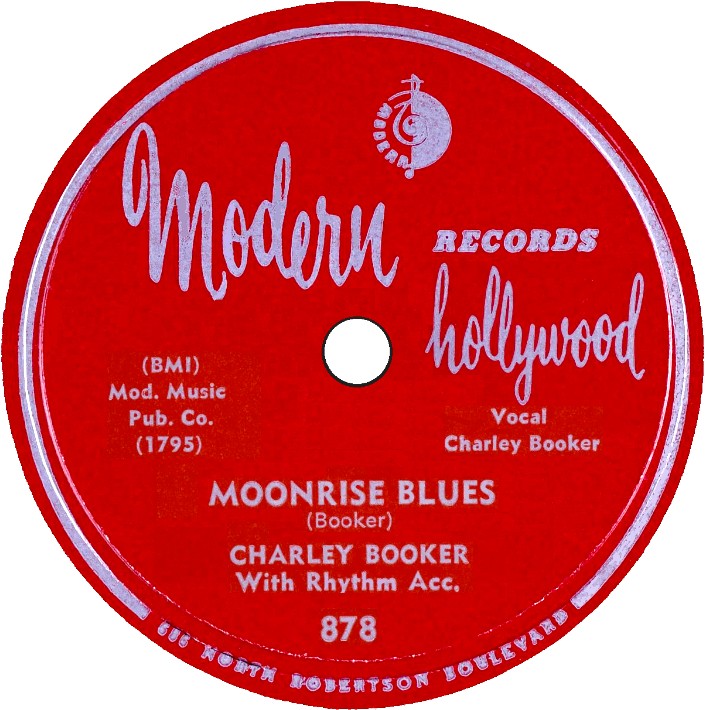
|
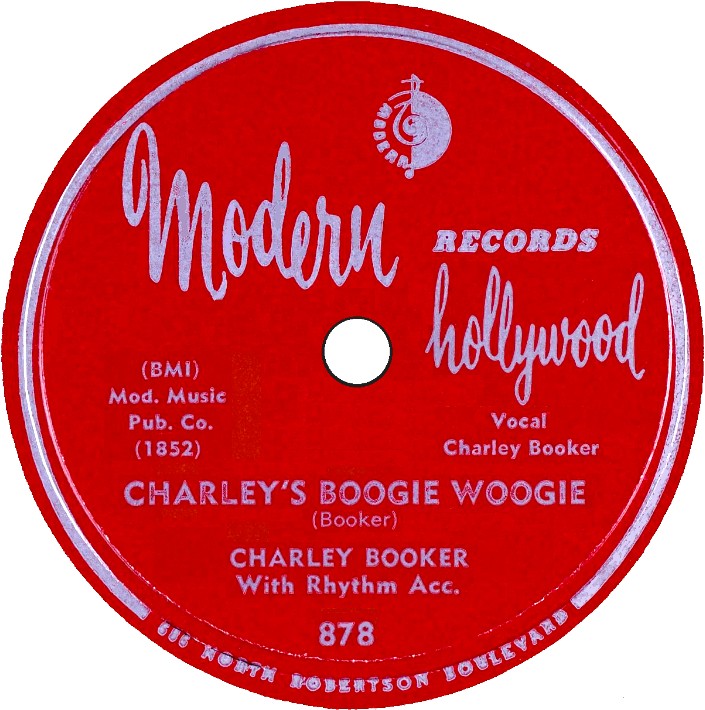
|
Above: Label image for both sides of Modern 878, released in 1952. Charley Booker had this lone record on the Modern label and one other record on Blues And Rhythm, one of Modern's subsidiary labels. LISTEN (Windows Media Player): [Audio restoration by Dave Saviet.]
1. "Moonrise Blues" - Charley Booker - Modern 878 - 1952.
2. "Charley's Boogie Woogie" - Charley Booker - Modern 878 - 1952.BOTH SONGS played in sequence.
Cash Box Review (9-6-52):
CHARLEY BOOKER — MODERN 878
Moonrise Blues (C+) Charley Bookerís easy singing style puts over a slow beat blues in an accepted fashion.
Charley's Boogie Woogie (C) The underportion is a fast boogie woogie that has Booker pulling out the stops and really belting.
(NOTE: A rating of C+ was considered as "good" and C as "fair".)
ROBERT BLAND:
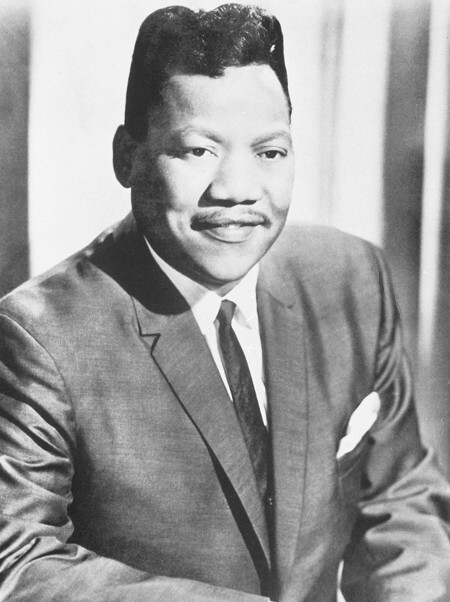
|
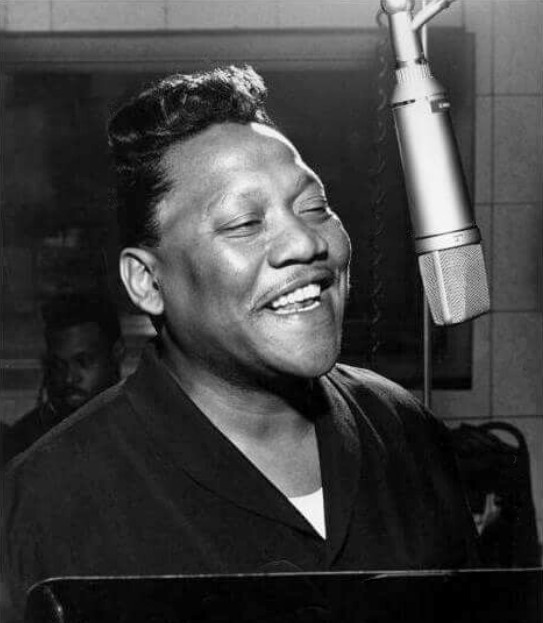
|
Above: Robert Bland, also known as "Bobby Bland" and "Bobby Blue Bland", was from Tennessee. Bland had just the one record on Modern in 1952. After that, he joined The Beale Streeters as vocalist. This is the band that backed Johnny Ace on his early records. From 1952 until about 1960, Bland, under the name "Bobby Blue Bland", had many releases on Duke Records (the same label that produced all the Johnny Ace hits).
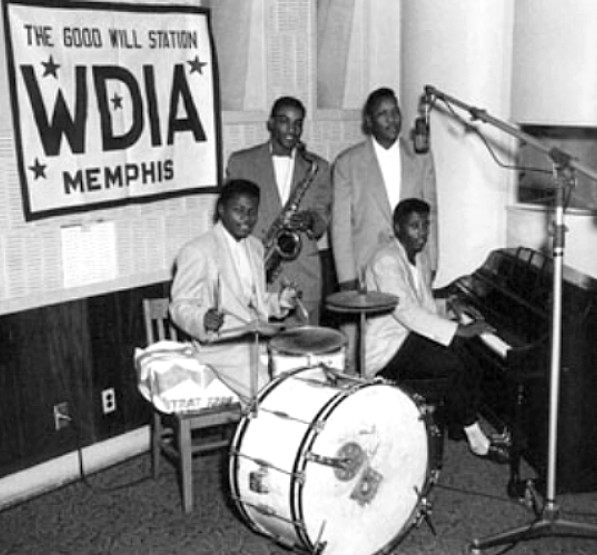
|
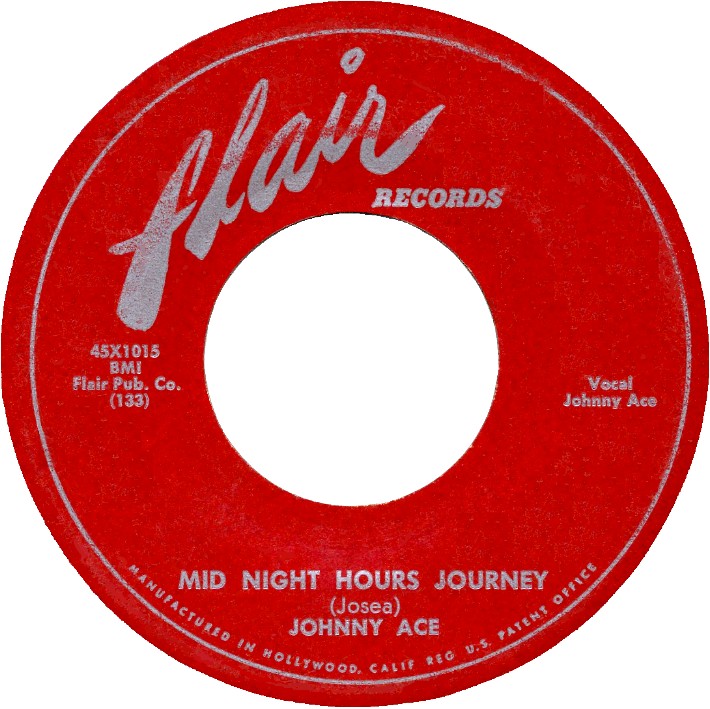
|
Above Left: The Beale Streeters (L-R) Earl Forest (drums), Billy Duncan (tenor saxophone), Bobby Bland (vocals), and Johnny Ace (piano). Above Right: Label Image for "Mid Night Hours Journey" which was released on Modern Records' subsidiary Flair 1015 in September 1953. The flip is a vocal by Earl Forest, possibly from the same session. As we learned earlier in this article, the credited composer, "Josea", is actually Joe Bihari.
The matrix number (133) indicates a recording date in September 1953. However, this side was probably recorded in early 1952 by "The Beale Streeters" when Johnny Ace was still known as John Alexander. The song had been recorded for Modern Records and was eventually released on their Flair label after Johnny Ace became an established star.
The Billboard Review (9/19/53): JOHNNY ACE — FLAIR 1015....
Midnight Hours Journey (74) This doesn't sound like the Johnny Ace now on Duke Records, but it may have been made a while ago. Under any circumstances it is an effective performance and it should pull spins and loot on the basis of the name, if for no other reason.(NOTE: A ratings range of 70-79 was considered "good.")
Listen to "Mid Night Hours Journey" - Johnny Ace - Flair 1015 - 1953 (Windows Media Player)..
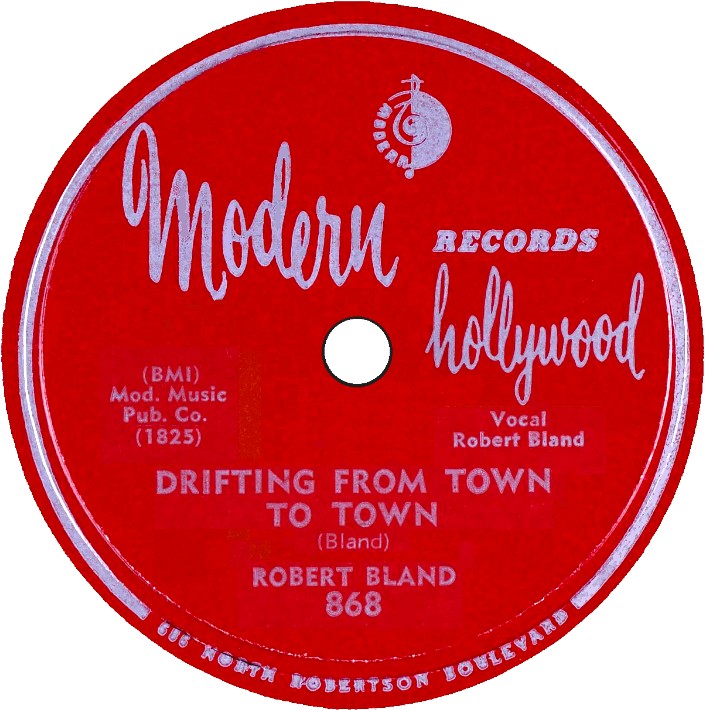
|
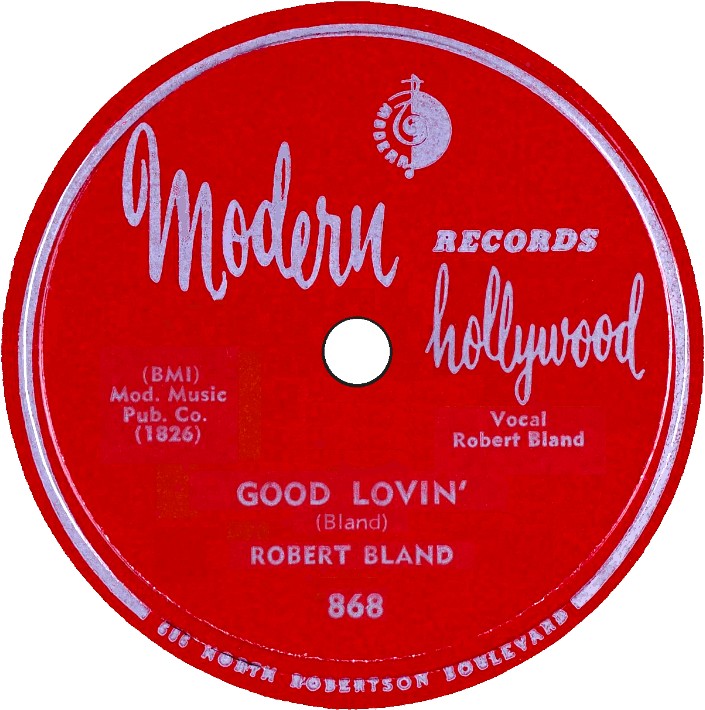
|
Above: Label image for both sides of Modern 868, released in 1952. Ike Turner is backing Robert Bland on piano. LISTEN (Windows Media Player): [Audio restoration by Dave Saviet.]
1. "Drifting From Town To Town" - Robert Bland - Modern 868 - 1952.
2. "Good Lovin'" - Robert Bland - Modern 868 - 1952.BOTH SONGS played in sequence.
MARY SUE:
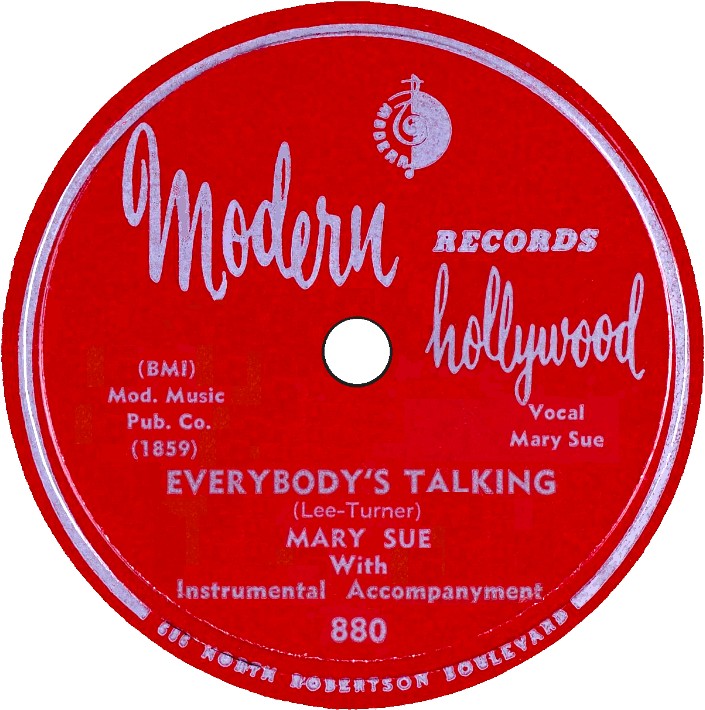
|
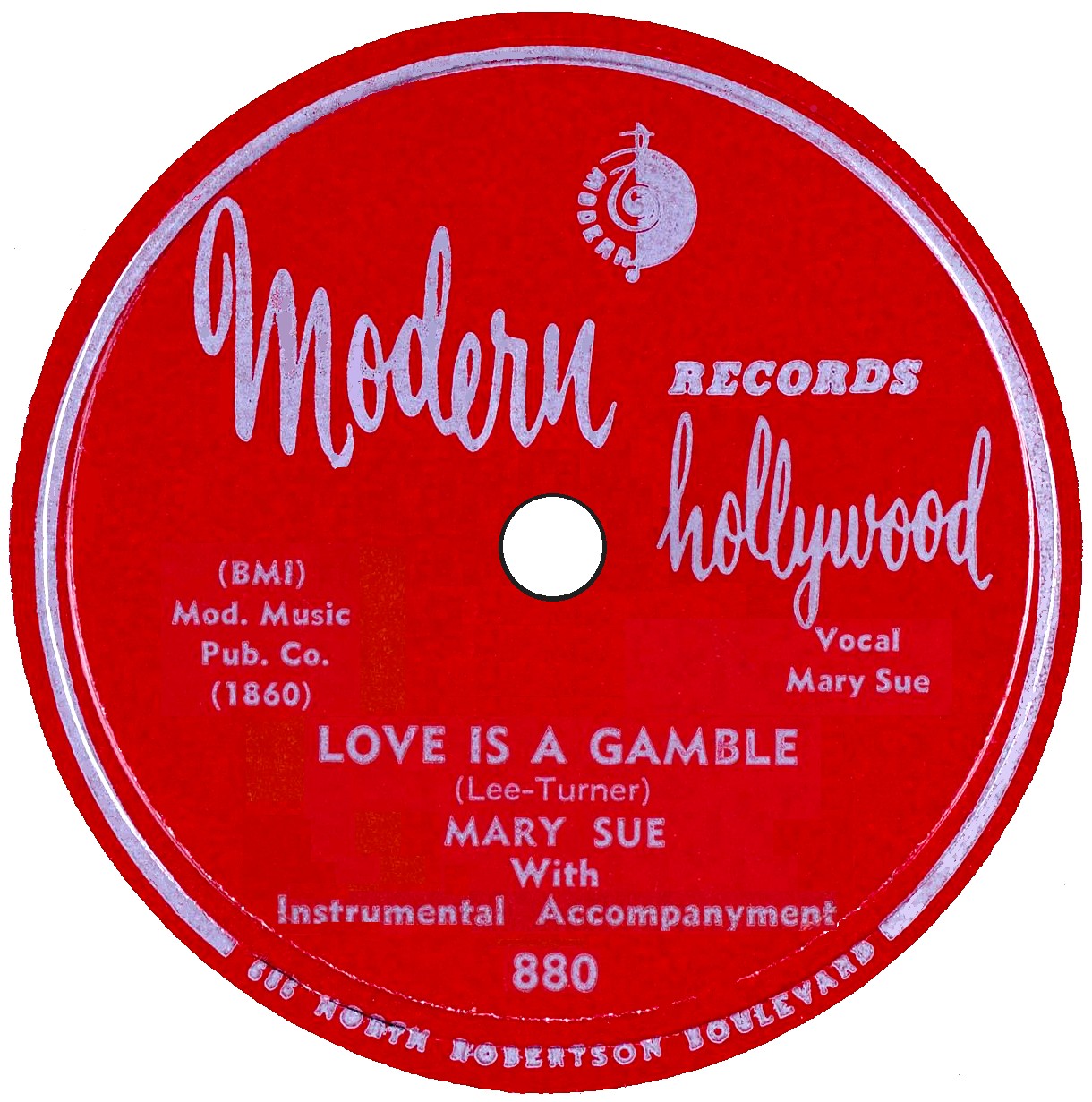
|
Above: Label image for both sides of Modern 880, released in 1952. This is Mary Sue's only record on Modern. She also had one record on Modern's subsidiary, RPM Records, as "Bonnie And Ike Turner" in 1952. The labels credit "Lee-Turner" as co-composers. Per the BMI website, the composer is "Ike Turner". BMI also lists "Mary Sue" and "Ike Turner" as the "performers" of the song.
FROM MARV GOLDBERG: (8/20/22)
As far as Mary Sue, many sources.... identify her as "Bonnie Turner", Ike's wife. Bonnie's real name seems to have been "Marian Louis Lee". The first name could be "Marion"; sources differ).
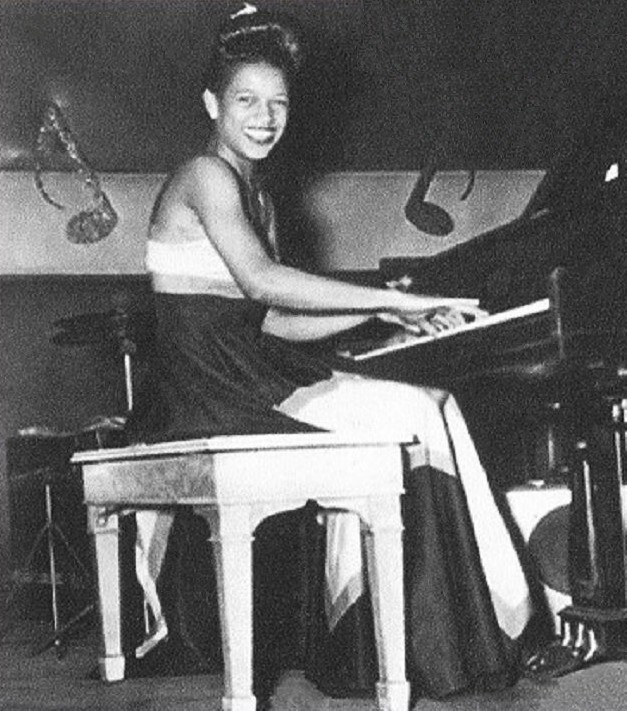
|
Above: Mary Sue, also known as Bonnie Turner and Marian Louis Lee.
LISTEN (Windows Media Player): [Audio restoration by Dave Saviet.]
1. "Everybody's Talking" - Mary Sue - Modern 880 - 1952.
2. "Love Is A Gamble" - Mary Sue - Modern 880 - 1952.BOTH SONGS played in sequence.
Cash Box Review (10-4-52):
MARY SUE — MODERN 880
Love Is A Gamble (C+) A quick moving jump is projected with spirit by thrush Mary Sue.
Everybody's Talking (C+) A similar item is fetchingly sold by Mary Sue.
(NOTE: A rating of C+ was considered as "good".)
CASH BOX, August 30, 1952: DISK MAKES BOW—NEW 7" 78 RPM
HOLLYWOOD—Modern Records is currently putting out its records on a new type of disk. Itís a seven inch 78 rpm and its been created by the Superior Recording Co. of Hollywood. The record is a semi-microgroove platter and has the same recording time as the standard 10" 78 rpmís.The new records incorporate the nonslip features patented by the Research Craft Co., also of Hollywood, whereby ten small platters can be stacked on a turntable without any slippage.
Many advantages are claimed for the platters. The disk averages 2 cents per pressing cheaper at the pressing plants. In addition, Modern has found them to be ideal for use as dj samples as the firm has found the saving in postage and packaging to be enormous. Previously dj samples were mailed in cartons costing 7 to 9 cents per box; now they are being mailed in manila envelopes costing 1½ cents each. Postage has been cut 75%.
In addition, salesman seem to like the new disks because of their compactness.
Modernís experiment in using the disks has turned out so well that it is expected now that several other firms will be using them shortly.
NOTE: Keep in mind that 7" 45-rpm records were currently in use at this time by most independent record companies. In fact, Modern Records had introduced their entry into the 45-rpm format in March 1950.
Yes, much of Modern Records' customer base did not yet have 45-rpm players, but why would they want the 7" 78-rpm instead of the 10"?
This concept, with the exception of Bell Records, went mostly nowhere. Bell Records released many 7" 78-rpm records in 1953-1955. These records featured remakes of popular hits of the time. See example image at right.
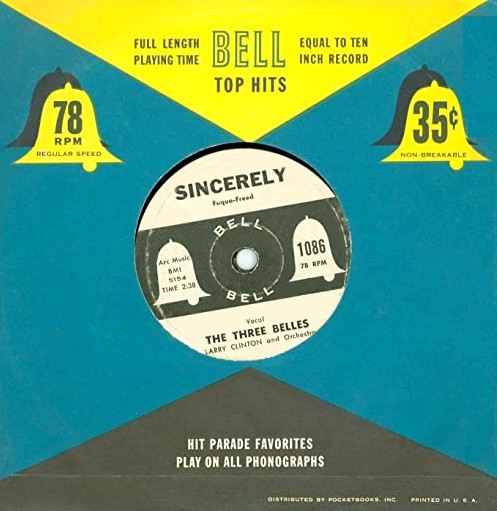
This record mirrored the McGuire Sisters' Coral record with
"No More" on the flip-side for both.
MODERN RECORDS - PART ONE FEATURES HADDA BROOKS, PEARL TRAYLER, THE THREE BITS OF RHYTHM, GENE PHILLIPS, LITTLE WILLIE JACKSON, THE COMMANDERS, THE SCAMPS, AND THE SONGS "ROMANCE IN THE DARK", "I'LL BE TRUE", "LONESOME ROAD", AND "I'M FALLING FOR YOU". MODERN RECORDS - PART TWO FEATURES LILLIE GREENWOOD, LITTLE WILLIE LITTLEFIELD, PEE WEE CRAYTON, LITTLE ESTHER, SMOKEY HOG, GEORGE BLEDSOE AND THE MOON MISTS, THE SMITH JUBILEE SINGERS, AND MODERN RECORDS' COLONIAL LABEL.
MODERN RECORDS - PART FOUR FEATURES JOHNNY MOORE'S THREE BLAZERS, MARI JONES, FRANKIE ERVIN, OSCAR McLOLLIE, YOUNG JESSIE, JIMMY McCRACKLIN, JOHN LEE HOOKER, AND THE FOUR OF US. ALSO, THE SONGS "DRIFTING BLUES", "MY SONG", "C.O.D.", AND "I SMELL A RAT".
MODERN RECORDS - PART FIVE FEATURES JESSE BELVIN, THE CLIQUES, JIMMY BEASLEY, THE CADETS/JACKS, DOLLY COOPER, ETTA JAMES, THE COBRAS, FRED DARIAN AND THE DREAMERS, JIMMIE LEE AND ARTIS, THE SOUNDS, AND THE ROCKETS. ALSO, THE SONGS "NEAR YOU", "ROLLIN' STONE", "SIXTY MINUTE MAN", "I GOT LOADED", "STRANDED IN THE JUNGLE", "THE HENRY SONGS", AND "SINDY (CINDY)".
MODERN RECORDS - PART SIX FEATURES B.B. KING, THE NIC NACS, THE ROBINS, ARTHUR LEE MAYE AND THE CROWNS, DONNA HIGHTOWER (WITH VOCAL GROUP), JOE HOUSTON, ROSCOE GORDON, LIGHTNING HOPKINS, AND LUKE JONES. ALSO, THE SONGS "DON'T YOU THINK I OUGHTA KNOW" AND "SHTIGGY BOOM".
MODERN RECORDS - PART SEVEN FEATURES THE TEEN QUEENS, JIMMY NELSON, THE CHANTERS, CURTIS IRVIN AND THE SPARKS, BUDDY MILTON AND THE TWILIGHTERS, LITTLE GEORGE SMITH, THE FLAIRS, THE CHIMES, SHIRLEY GUNTER AND THE QUEENS, KAY BROWN (WITH VOCAL GROUP), BOBBY RELF AND THE LAURELS, AND MERCY DEE. ALSO, THE SONGS "EDDIE MY LOVE", "OOP SHOOP", AND "HEADIN' HOME".
MODERN RECORDS - PART EIGHT FEATURES RICHARD BERRY, THE DREAMERS, THE RAMS, WILLARD McDANIEL, THE DRIFTERS (CROWN), THE ORIGINAL JUBALAIRES, KAY BROWN, ELMORE JAMES, J.T. BROWN, AND B.B. KING. ALSO, THE SONGS "YOUR FEET'S TOO BIG", "I'VE WAITED ALL MY LIFE FOR YOU", "YOU WON'T LET ME GO", AND "LOVE ME".
Listen to all of this article's audio selections using Windows Media Player:
[Audio restoration by Dave Saviet.]
|
1. "Bewildered" - Hadda Brooks With The Ebonaires - Modern 20-662A - 1949.
2. "Juke Box Boogie" - Hadda Brooks Trio - Modern 20-662B - 1949. 3. "He's Coming Home" - Hadda Brooks (And Vocal Group) - Okeh 7031 - 1954. 4. "I Don't Mind" - Hadda Brooks (And Vocal Group) - Okeh 7031 - 1954. 5. "Anytime, Anyplace, Anywhere" - Hadda Brooks - Crown LP CLP 5314 - 1957. 6. "Bewildered" - The Vocalaiers - Sensation 10 - 1949. 7. "Bewildered" - Amos Milburn - Aladdin 3018A - 1948. 8. "Bewildered" - Joe Medlin And The Three Riffs - Atlantic 867 - 1948. 9. "Bewildered" - Lonnie Johnson - King 4261-A - 1948. 10. "Bewildered" - Billy Eckstine And The Quartones - M-G-M 10340-B - 1949. 11. "Bewildered" - The Ink Spots - Decca 24566 A - 1949. 12. "Song Of The Wanderer" - The Ebonaires - Modern 20-656A - 1949. 13. "Sleepy Time Gal" - The Ebonaires - Modern 20-656B - 1949. 14. "Bye Bye, Bye Bye" - The Ebonaires - M-G-M 10361-A - 1949. 15. "Come In Mr. Blues" - The Ebonaires - M-G-M 10361-B - 1949. 16. "Three O'Clock In The Morning" - The Ebonaires - Aladdin 3211 - 1953. 17. "Baby, You're The One" - The Ebonaires - Aladdin 3211 - 1953. 18. "3 O'Clock In The Morning" - The Miltones (Floyd Ray And The Blenders) - Miltone 213 - 1947. 19. "Three O'Clock In The Morning" - Floyd Ray And His Orchestra (Vocal By Ensemble) - Decca 2337 A - 1939. 20. "Three O'Clock In The Morning" - Gene Phillips And His Rhythm Aces (Vocal By Ensemble) - Modern Music 20-519A - 1947. 21. "Hard Workin' Blues" - Jimmy Witherspoon - Modern 20-737B - 1950. 22. "There Ain't Nothing Better" - Jimmy Witherspoon And His Gal Friday - Modern 20-782A - 1950. 23. "Once There Lived A Fool" - Jimmy Witherspoon - Modern 20-793A - 1950. 24. "I'm Just A Ladies Man" - Jimmy Witherspoon - Modern 20-793B - 1950. 25. "Ain't Nobody's Business Part 1" - Jimmy Witherspoon - Swing Time 263A - 1951. 26. "Ain't Nobody's Business Part 2" - Jimmy Witherspoon - Swing Time 263A+ - 1951. 27. "Nobodyís Business If I Do" - Bob Geddins' Cavaliers - Gilt-Edge GE-5022 - 1950. 28. "Hey, Hey, Baby" - Helen Humes (With Vocal Group) - Modern 846 - 1951. 29. "Laziest Gal In Town" - Helen Humes - Modern 846 - 1951. 30. "I Ain't In The Mood" - Helen Humes - Modern 851 - 1951. 31. "Living My Life My Way" - Helen Humes - Modern 851 - 1951. 32. "Be-Baba-Leba" - Helen Humes With Bill Doggett Octet - Philo PV106B - 1945. 33. "E-Bob-O-Le-Bob" - The Flennoy Trio (Vocal By Tina Dixon) - Excelsior FT-130 - 1945. 34. "I Just Refuse To Sing The Blues" - Helen Humes - Mercury 8056-A - 1947. 35. "They Raided The Joint" - Helen Humes - Mercury 8056-B - 1947. 36. "They Raided The Joint " - Dallas Barkley And The Band That Comes On - Cosmo 476 - 1946. 37. "You're The Sweetest Thing" - Roy Hawkins - Modern 812-A - 1950. 38. "I Walk Alone" - Roy Hawkins - Modern 842 - 1951. 39. "I Don't Know Just What To Do" - Roy Hawkins Orhestra (Vocal By Roy Hawkins) - Modern 853 - 1951. 40. "You're A Free Little Girl" - Roy Hawkins Orhestra (Vocal By Roy Hawkins) - Modern 853 - 1951. 41. "Moonrise Blues" - Charley Booker - Modern 878 - 1952. 42. "Charley's Boogie Woogie" - Charley Booker - Modern 878 - 1952. 43. "Drifting From Town To Town" - Robert Bland - Modern 868 - 1952. 44. "Good Lovin'" - Robert Bland - Modern 868 - 1952. 45. "Everybody's Talking" - Mary Sue - Modern 880 - 1952. 46. "Love Is A Gamble" - Mary Sue - Modern 880 - 1952. ALL FORTY-SIX ABOVE SONGS played in sequence. ALL TWENTY-FOUR ABOVE MODERN, MODERN MUSIC, CROWN, AND FLAIR LABEL SONGS played in sequence.
|
Last Update: August 17, 2022
E-mail Me: